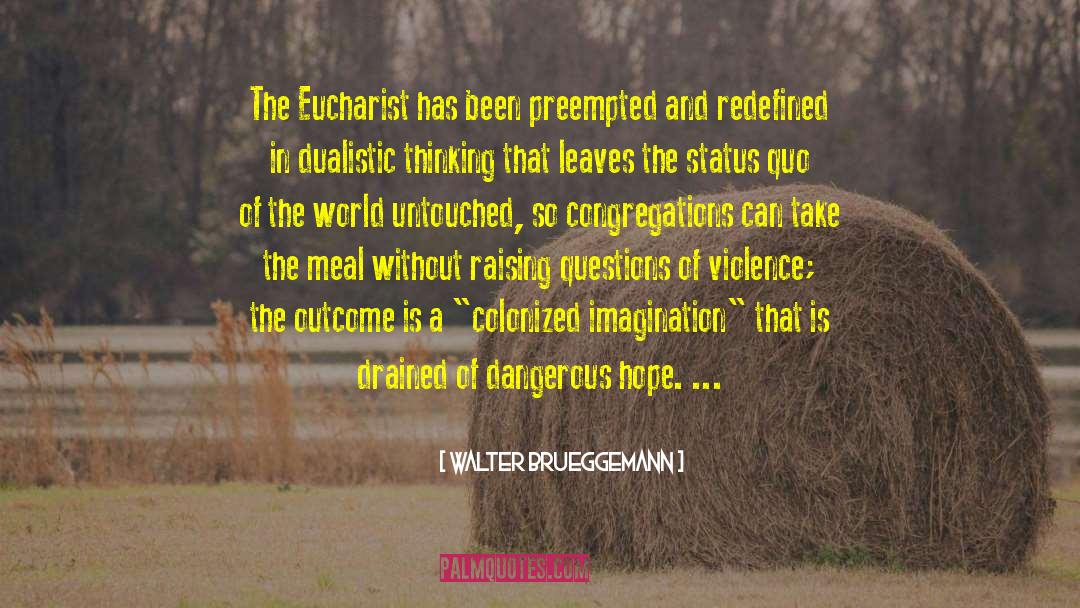Walter Brueggemann Famous Quotes
Reading Walter Brueggemann quotes, download and share images of famous quotes by Walter Brueggemann. Righ click to see or save pictures of Walter Brueggemann quotes that you can use as your wallpaper for free.
Quite clearly, the one thing the dominant culture cannot tolerate or co-opt is compassion, the ability to stand in solidarity with the victims of the present order. It can manage charity and good intentions, but it has no way to resist solidarity with pain or grief. So
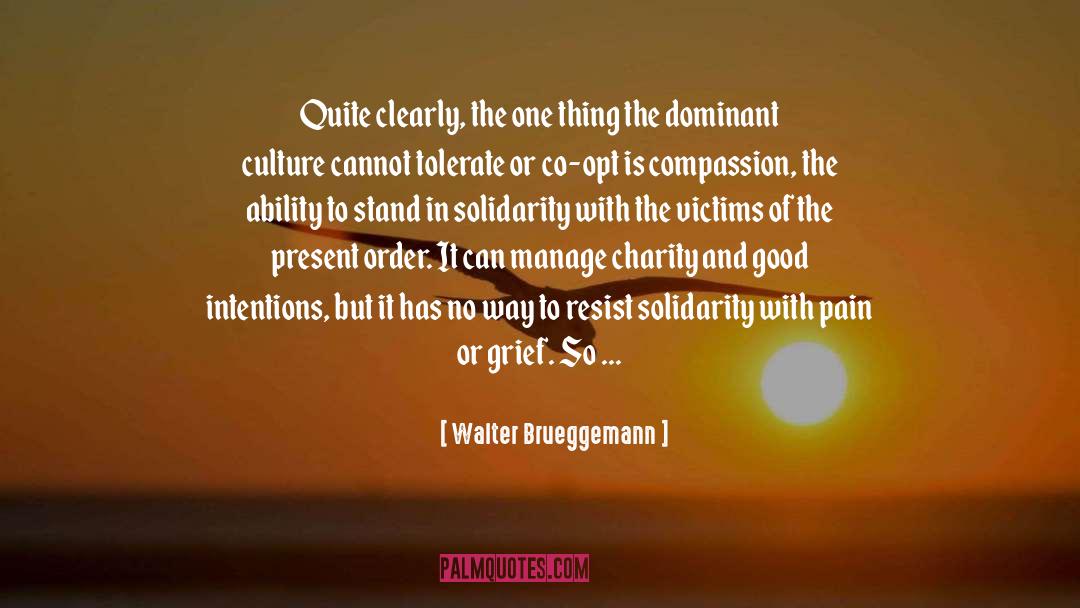
We have nearly lost our capacity to think ihcologicafly about public issues and public problems.
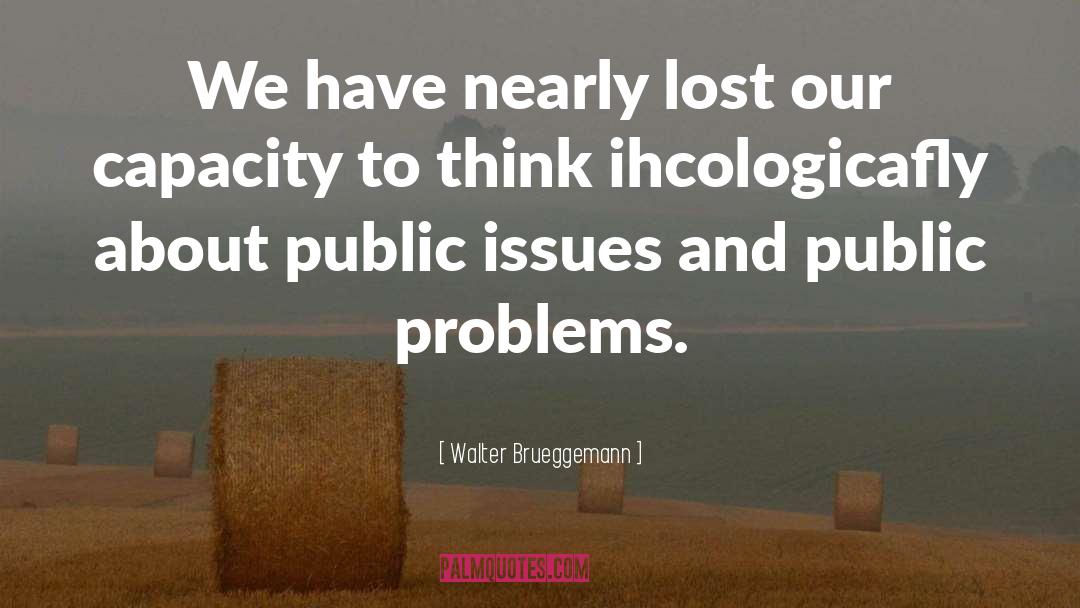
I have suggested creation is a work guaranteed by the king. The king is the one charged to order and preserve creation, and thus the return to chaos implicitly announces the failure of kingship and its end.
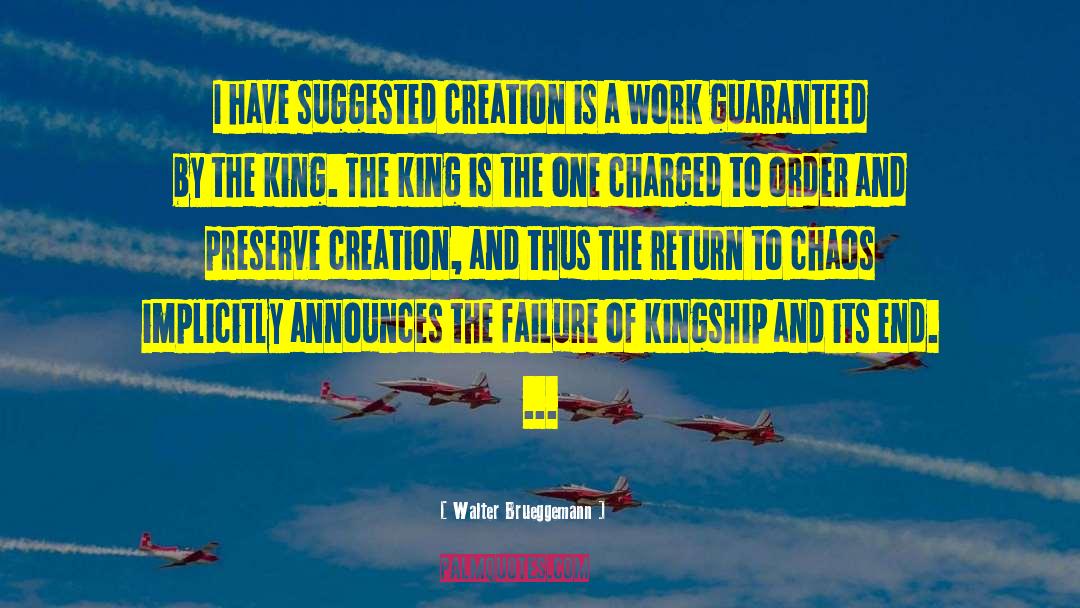
Hans Walter Wolff has suggested that the Sabbath is the great equalizer, for that day is a foretaste of the kingdom when all-great and small-are reckoned to be exactly equal .2' All-masters and slaves-are to engage in this most godlike activity of being at peace.
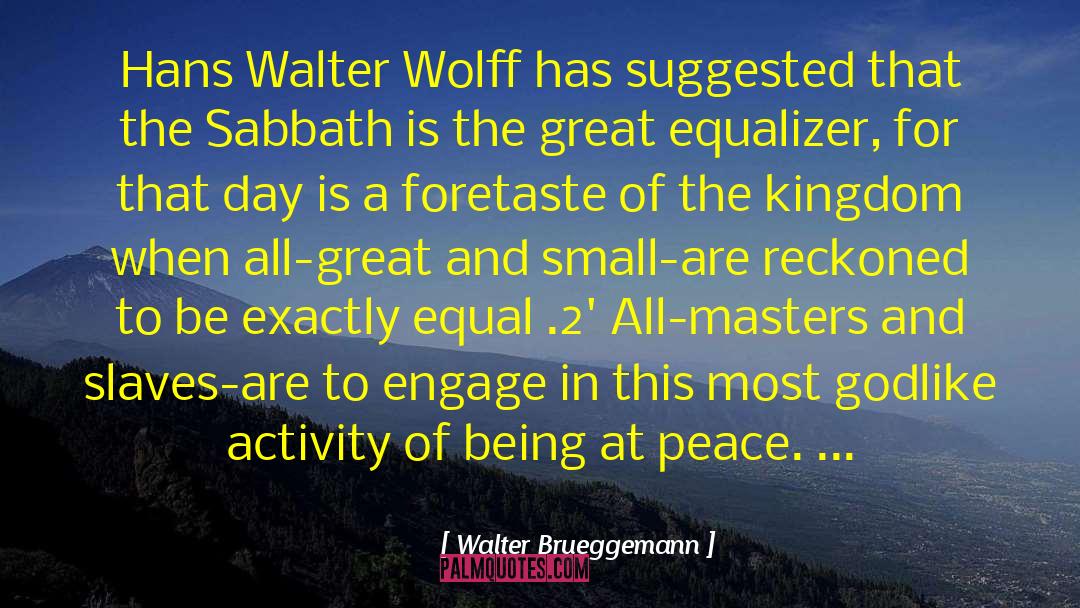
3. There is a text in its boldness. There is a congregation, perhaps reduced and diminished by fatigue. Third, there is this specific occasion for speech.
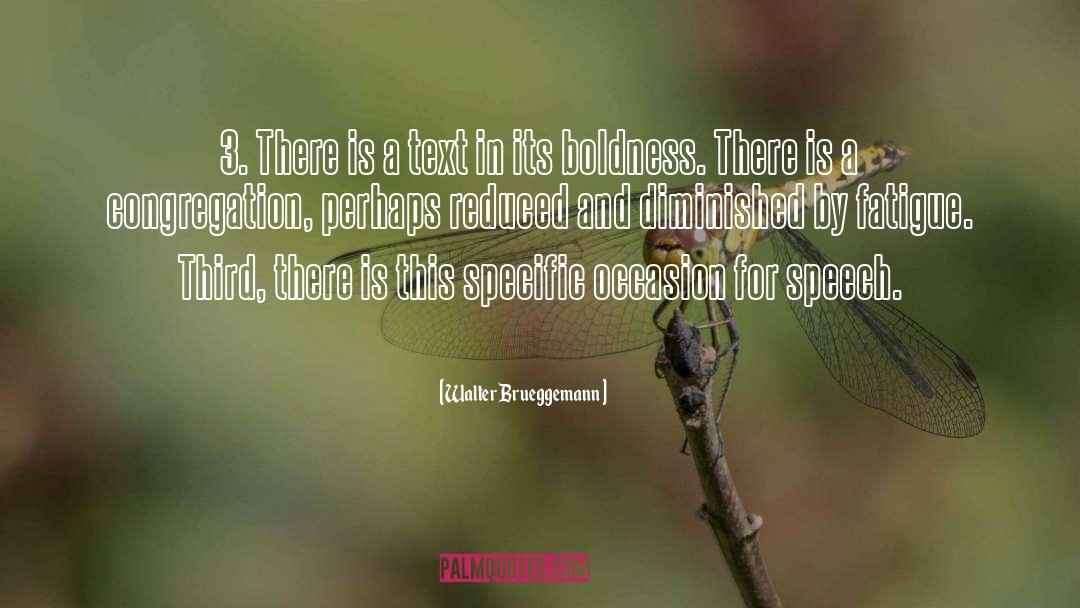
Compassion constitutes a radical form of criticism, for it announces that the hurt is to be taken seriously, that the hurt is not to be accepted as normal and natural but is an abnormal and unacceptable condition for humanness.
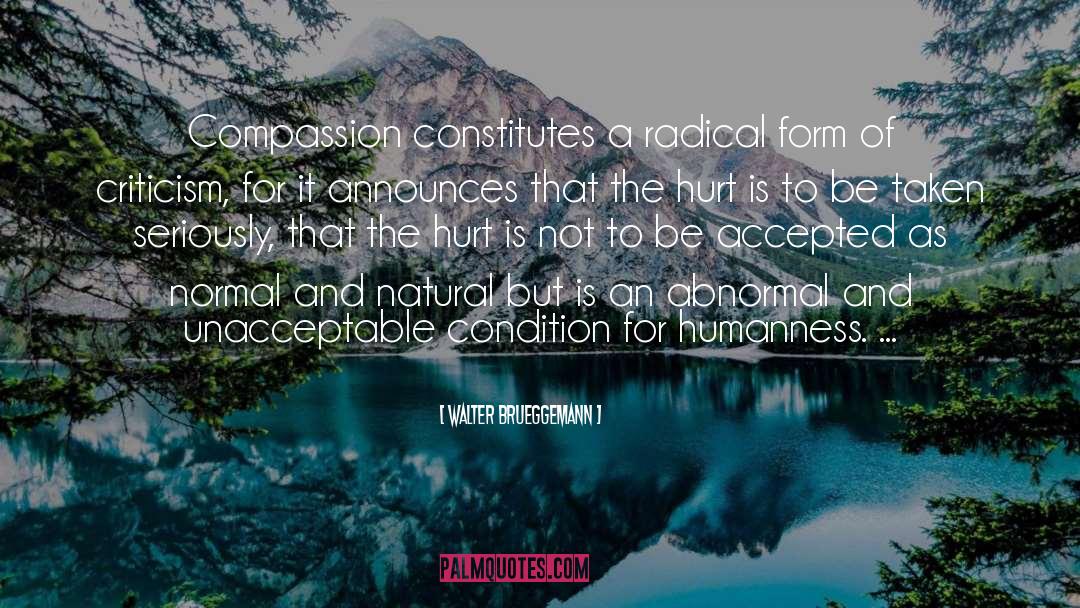
People of faith can read the Bible so that almost any perspective on a current issue will find some support in the Bible. That rich and multivoiced offering in the Bible is what makes appeals to it so tempting - and yet so tricky and hazardous, because much of our reading of the Bible turns out to be an echo of what we thought anyway. THE ISSUE OF LAND The dispute between Palestinians and Israelis is elementally about land and secondarily about security and human rights.
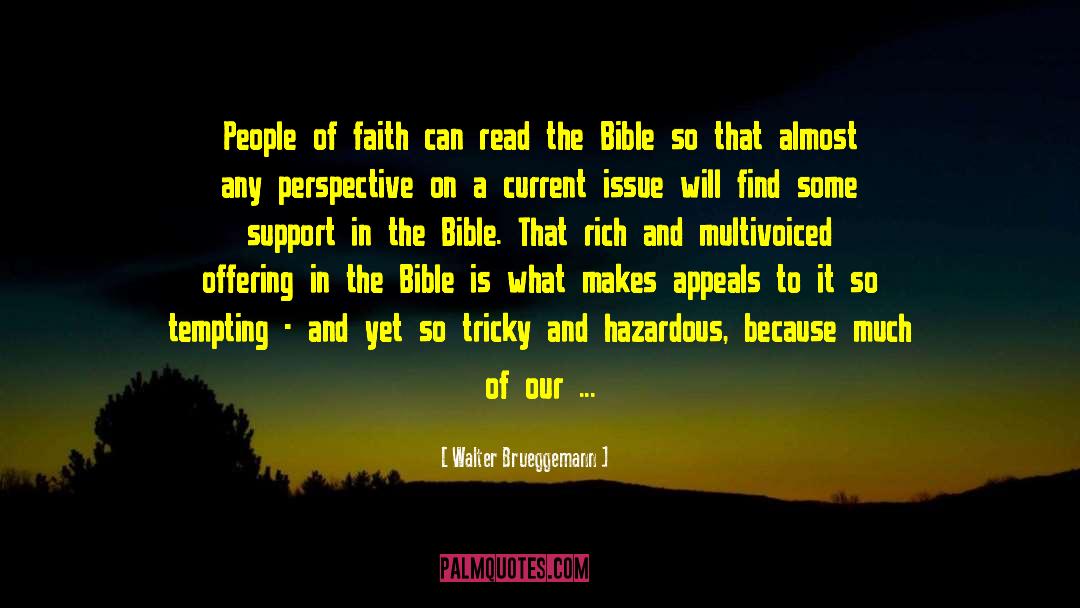
Hope requires a very careful symbolization. It must not be expressed too fully in the present tense because hope one can touch and handle is not likely to retain its promissory call to a new future. Hope expressed only in the present tense will no doubt be coopted by the managers of this age
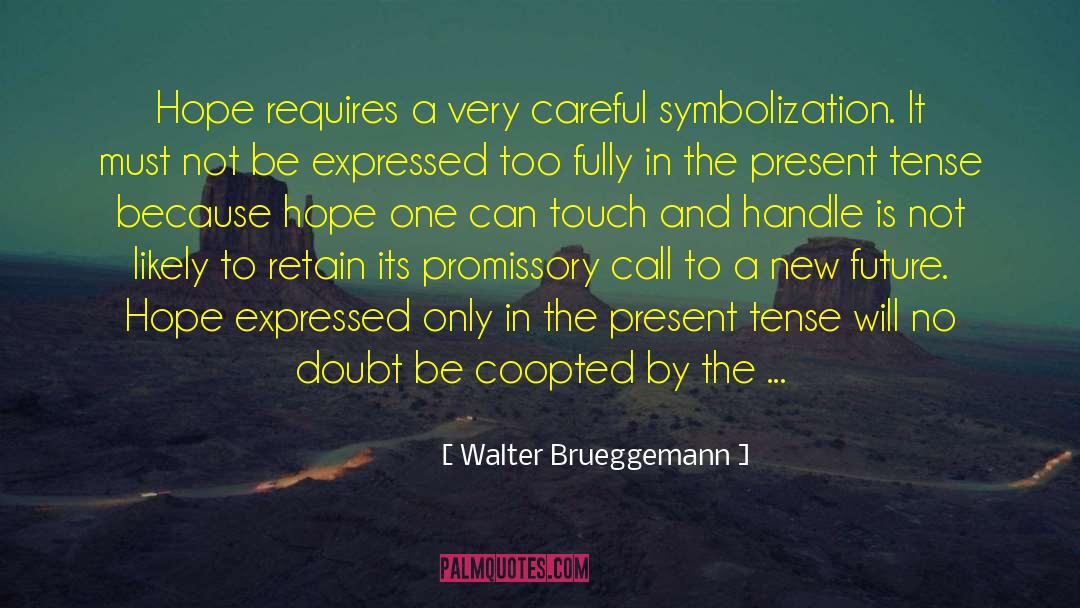
The task of prophetic ministry is to nurture, nourish, and evoke a consciousness and perception alternative to the consciousness and perception of the dominant culture around us.
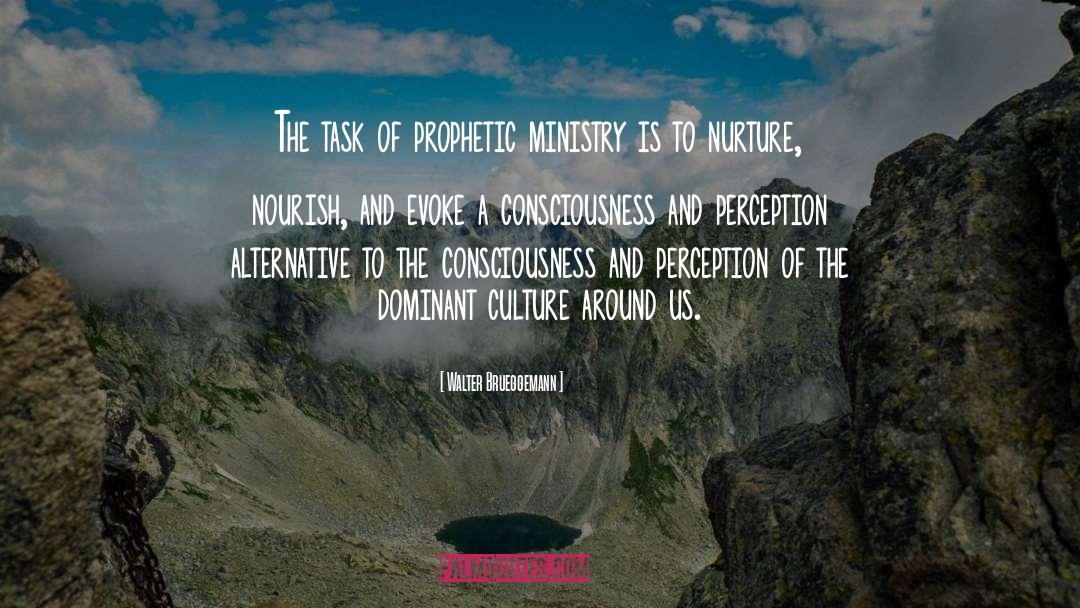
In sharp contrast, the blessings are speeches of new energy, for they promise future well-being to those who are without hope. In the deathly world of riches, fullness, and uncritical laughter, those who now live in poverty, hunger, and grief are hopeless. They are indeed nonpersons consigned to nonhistory. They have no public existence, and so the public well-being can never extend to them. But the blessings open a new possibility. So the speech of Jesus, like the speech of the entire prophetic tradition, moves from woe to blessing, from judgment to hope, from criticism to energy. The alternative community to be shaped from the poor, hungry, and grieving is called to disengage from the woe pattern of life to end its fascination with that other ordering, and to embrace the blessing pattern.
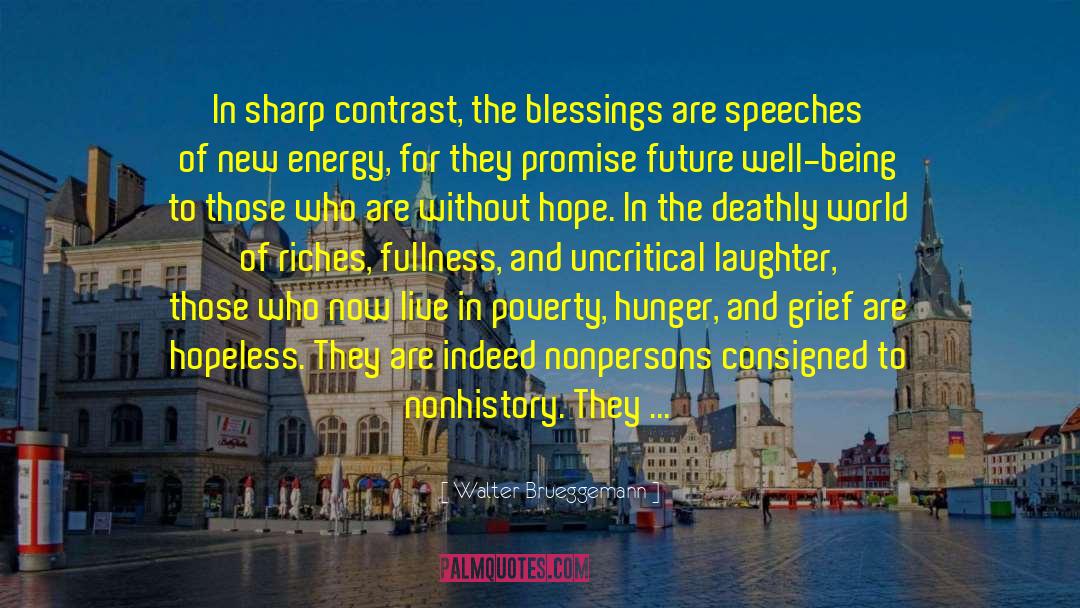
When we suffer from amnesia, every form of serious authority for faith is in question, and we live unauthorized lives of faith and practice unauthorized ministries.
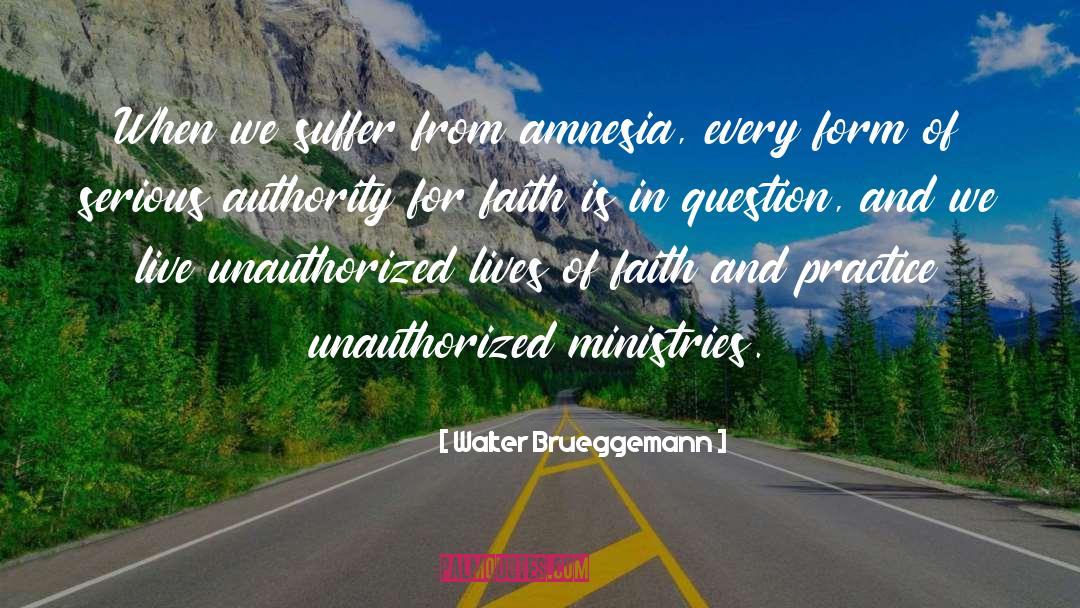
When we think "prophetic" we need not always think grandly about public tasks. The prophetic task needs to be done wherever there are men and women who will yield to the managed prose future offered them by the king. So, we may ask, if we are to do that alternative constructive task of imagination, if we are to reach more than the most surface group prepared to be "religious," where do we begin? What I propose is this: The royal consciousness leads people to numbness, especially to numbness about death. It is the task of prophetic ministry and imagination to bring people to engage their experiences of suffering to death.
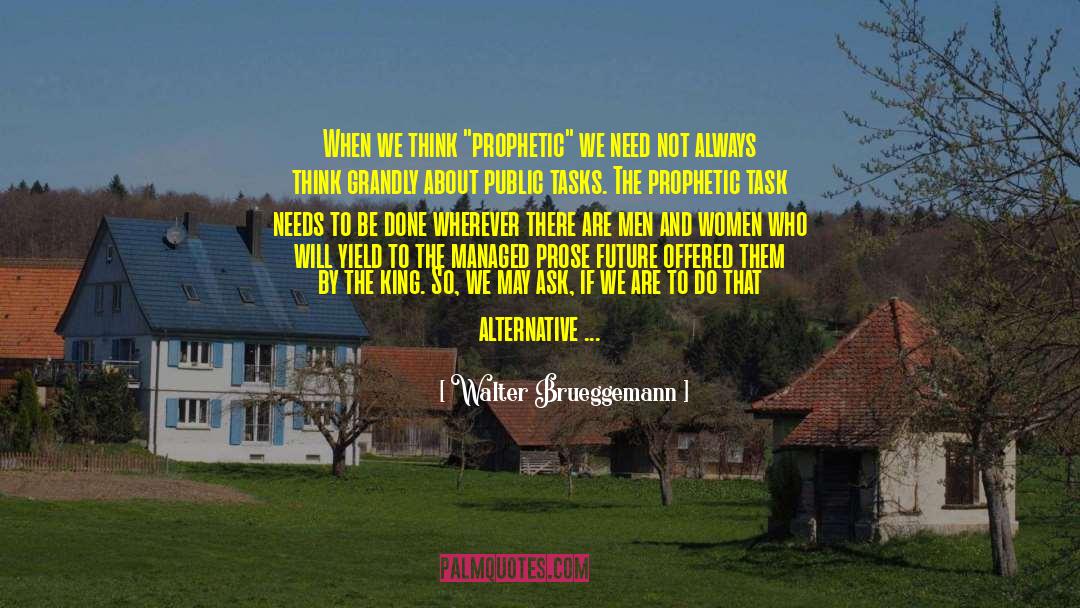
Multitasking is the drive to be more than we are, to control more than we do, to extend our power and our effectiveness. Such practice yields a divided self, with full attention given to nothing.
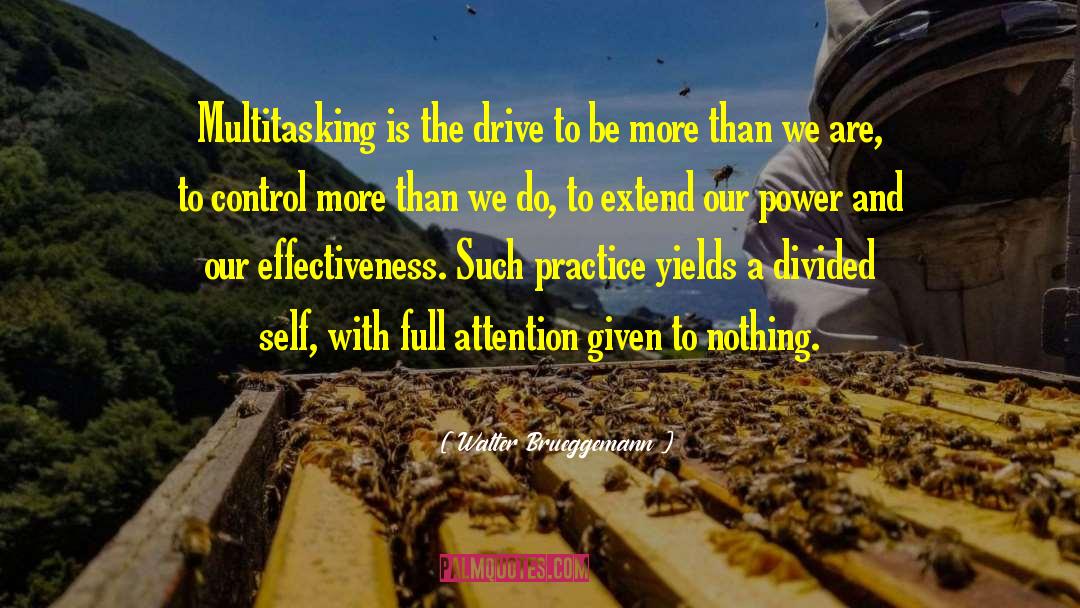
Advent Prayer
In our secret yearnings
we wait for your coming,
and in our grinding despair
we doubt that you will.
And in this privileged place
we are surrounded by witnesses who yearn more than do we
and by those who despair more deeply than do we.
Look upon your church and its pastors
in this season of hope
which runs so quickly to fatigue
and in this season of yearning
which becomes so easily quarrelsome.
Give us the grace and the impatience
to wait for your coming to the bottom of our toes,
to the edges of our fingertips.
We do not want our several worlds to end.
Come in your power
and come in your weakness
in any case
and make all things new.
Amen.
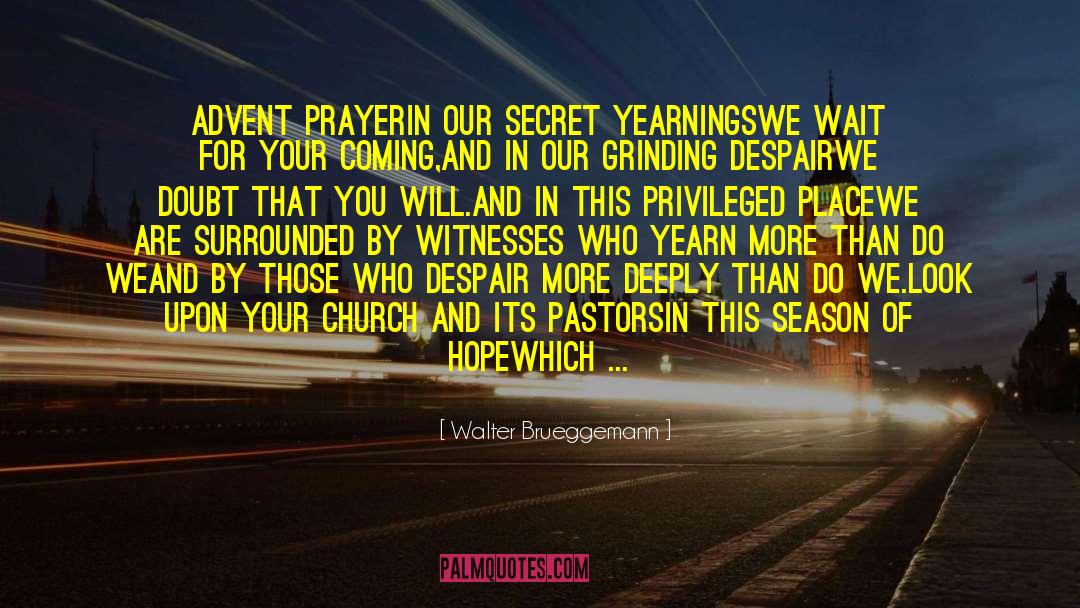
While the Passover narrative [in Exodus] energizes Israel's imagination toward justice, Israel's hard work of implementation of that imaginative scenario was done at Mt. Sinai ... Moses' difficult work at Sinai is to transform the narrative vision of the Exodus into a sustainable social practice that has institutional staying-power, credibility, and authority.
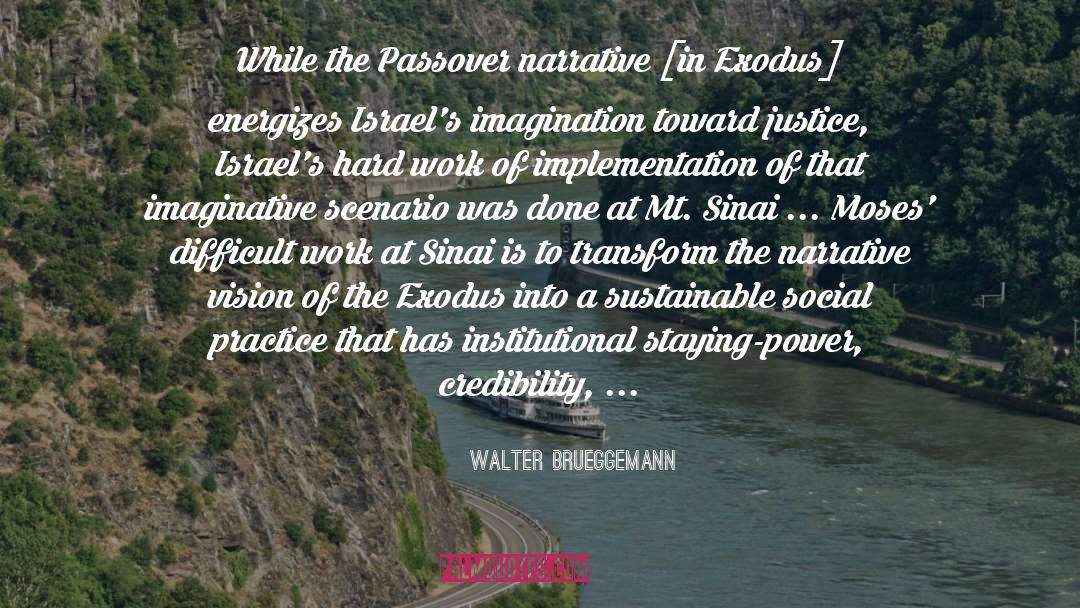
When serious people of good faith disagree, they've got to go back into the narratives and come at it again. One of the problems in the church is that people are not willing to do that. People have arrived at a place where they think they have got the answer.
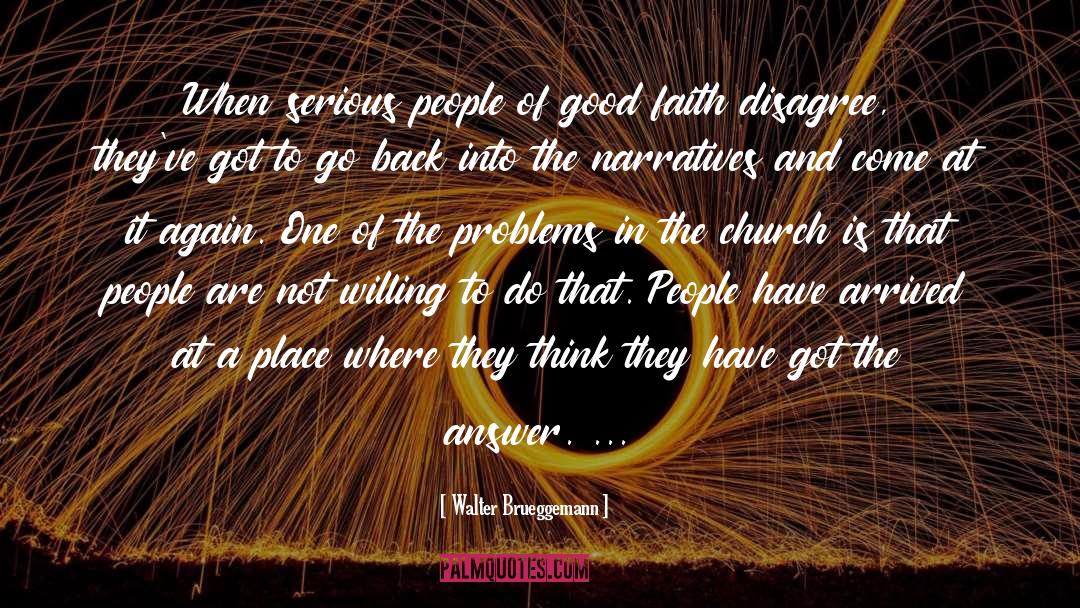
Sabbath is not simply the pause that refreshes. It is the pause that transforms.
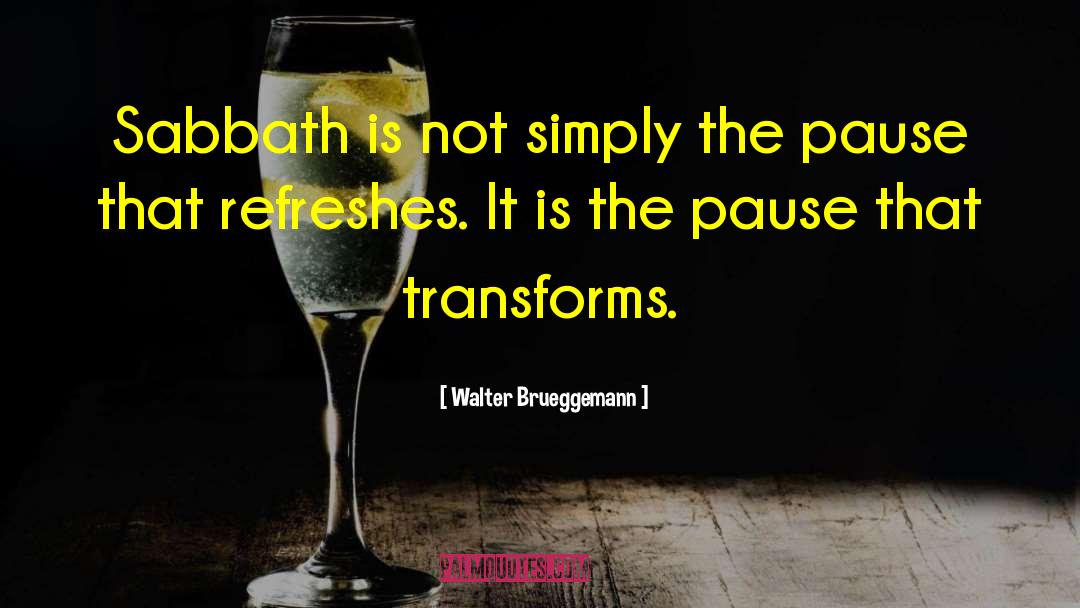
The shock of such a partner destabilizes us too much. The risk too great, the discomfort so demanding. We much prefer to settle for a less demanding, less overwhelming meeting. Yet we are haunted by the awareness that only this overwhelming meeting gives life.
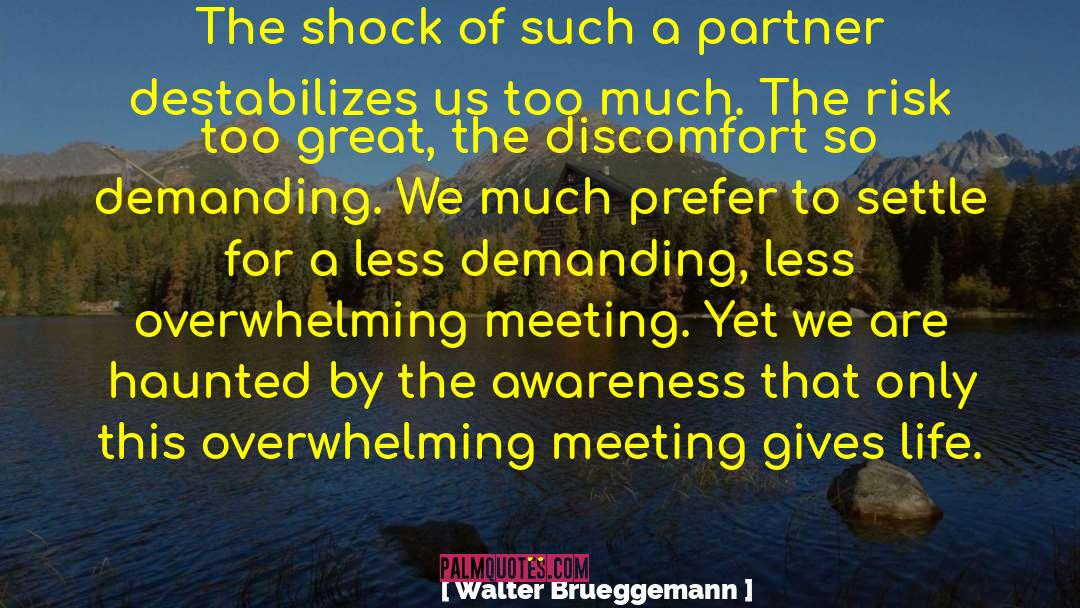
We may consider the sabbath as an alternative to the endless demands of economic reality, more specifically the demands of market ideology that depend, as Adam Smith had already seen, on the generation of needs and desires that will leave us endlessly "rest-less," inadequate, unfulfilled, and in pursuit of that which may satiate desire.
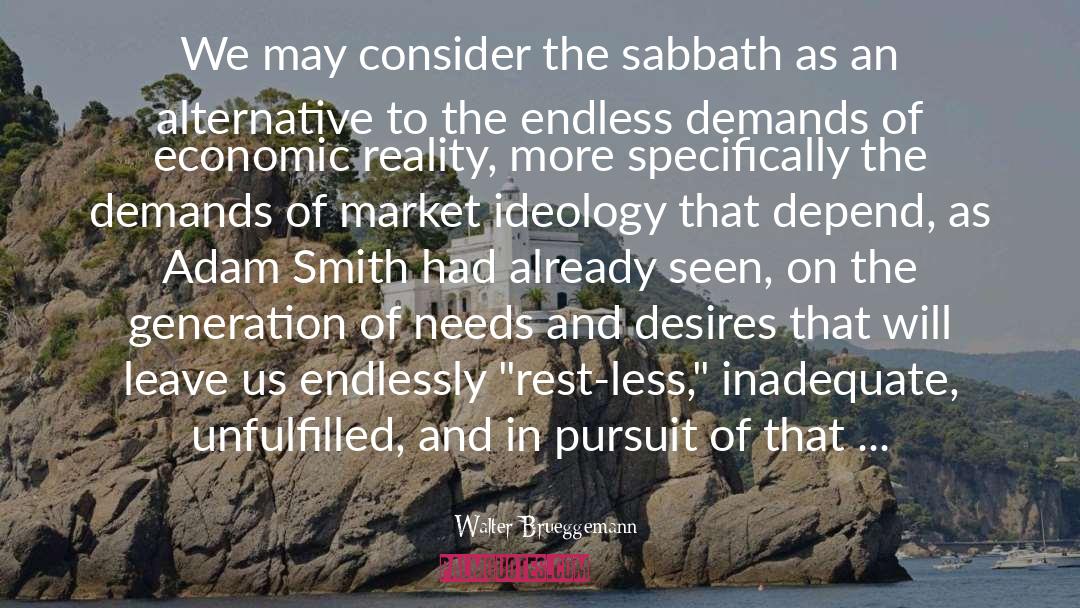
We now know that human transformation does not happen through didacticism or through excessive certitude, but through the playful entertainment of another scripting of reality that may subvert the old given text and its interpretation and lead to the embrace of an alternative text and its redescription of reality.
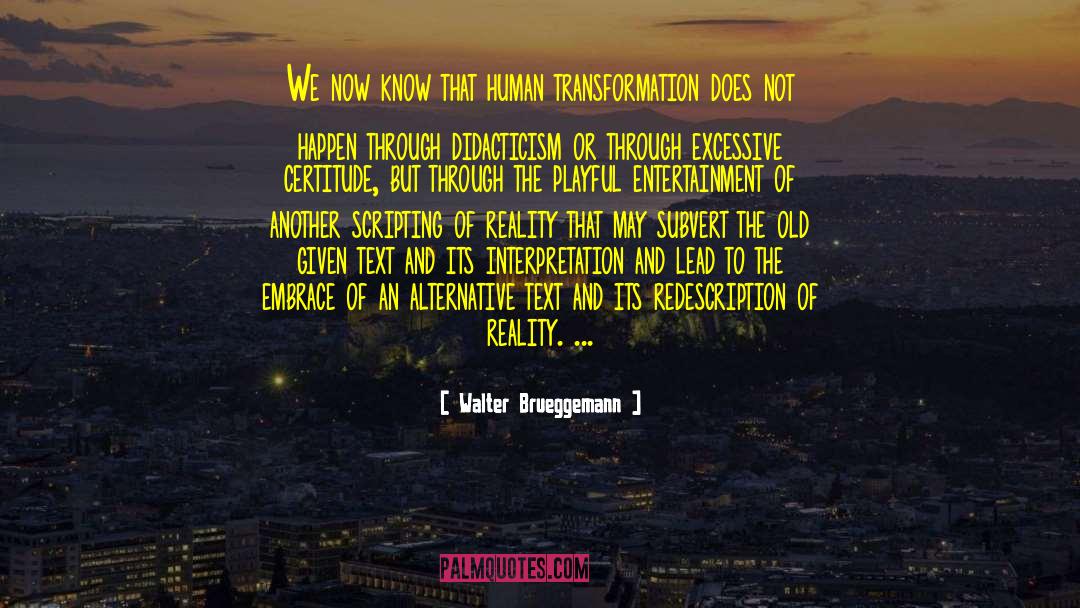
4. There is a text that looms in resilient power. There is a waiting congregation, perhaps not tired out, but too sure of self, pretending buoyancy where there might have been transformation. There is the voice that takes the old script and renders it to evoke a new world we had not yet witnessed (cf. Isa. 43:19). The fourth and final partner is this better world given as fresh revelation.
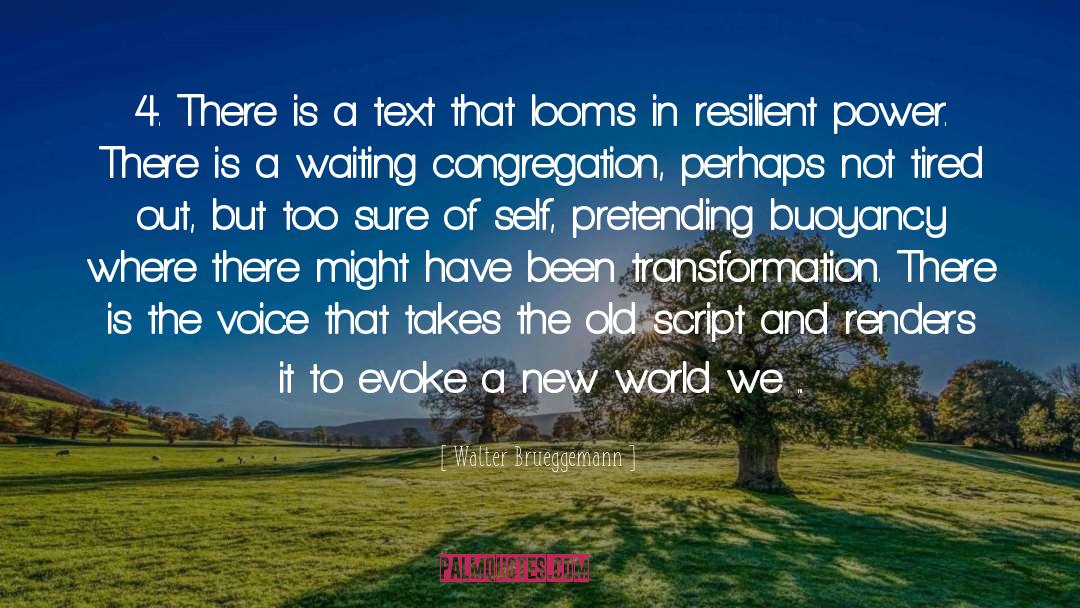
One compelling alternative to land theology is the recognition that Judaism consists most elementally in interpretation of and obedience to the Torah in its requirements of justice and holiness.

The deep places in our lives - places of resistance and embrace - are reached only by stories, by images, metaphors and phrases that line out the world differently, apart from our fear and hurt.
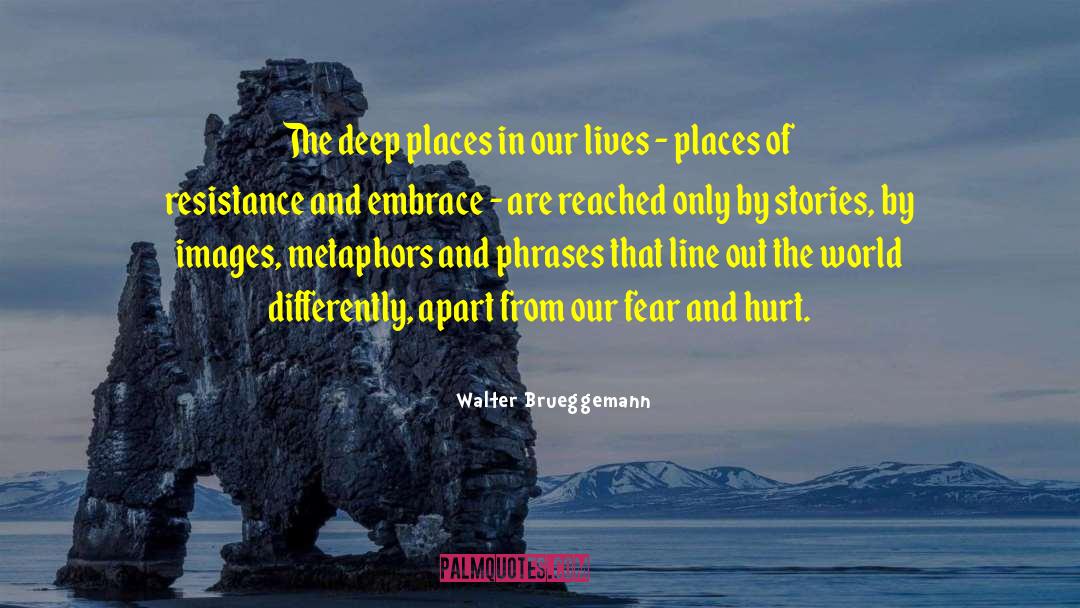
Here we are, practitioners of memos: We send e-mail and we receive it, We copy it and forward it and save it and delete it. We write to move the data, and organize the program, and keep people informed - and know and control and manage. We write and receive one-dimensional memos, that are, at best, clear and unambiguous. And then - in breathtaking ways - you summon us to song.
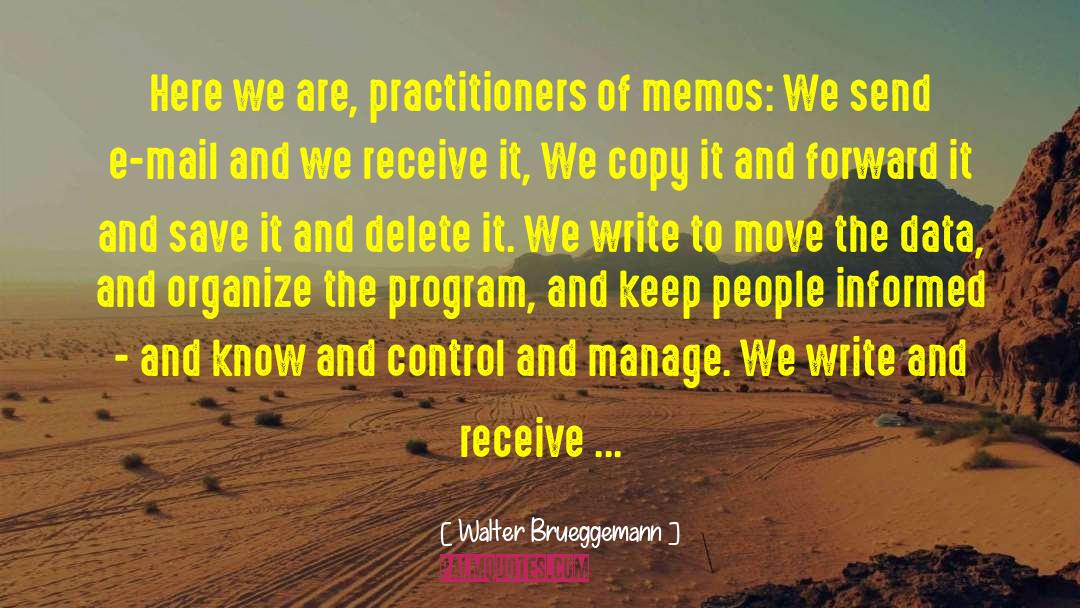
Personal voice- prophesy- disrupts the state of communal numbness in which most of us exist.
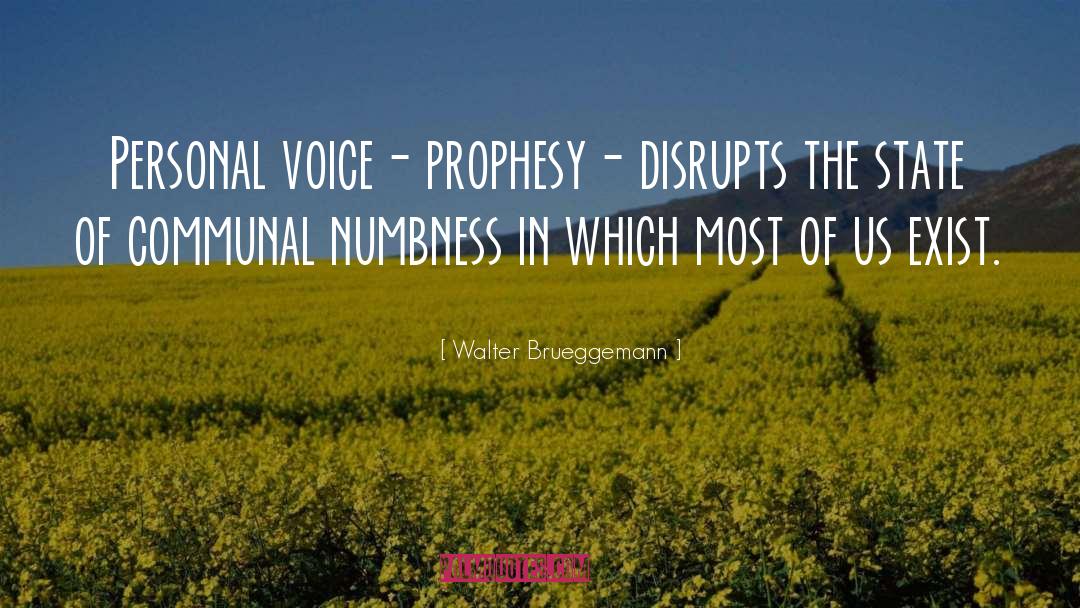
1. The first partner in the meeting is the text.

And when we take ourselves too seriously, we are grim about the brothers and sisters, especially the dissenting ones, and there will be no health in us and no healing humor.
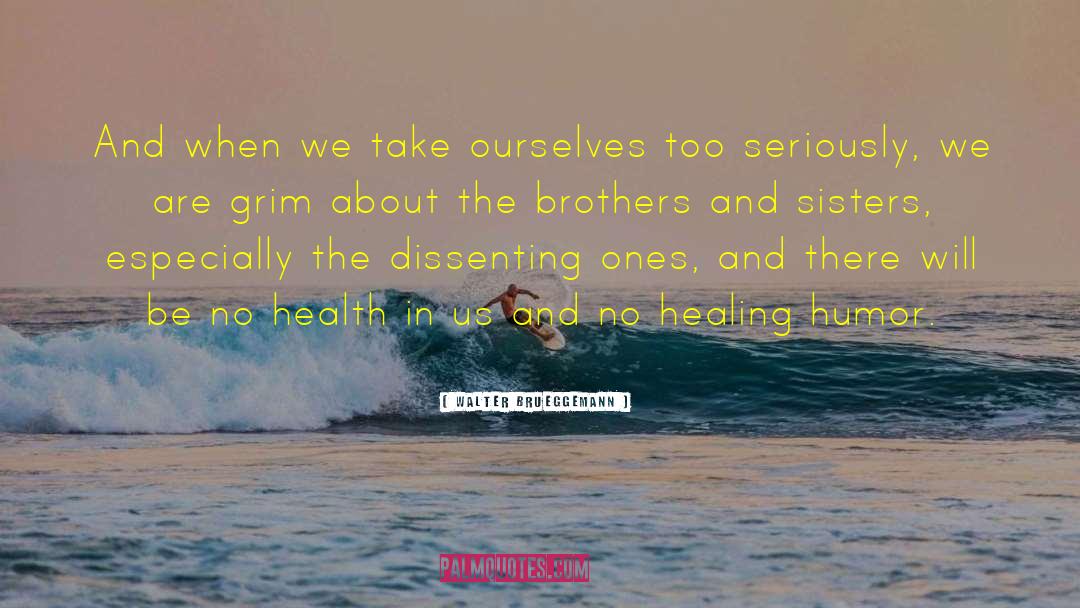
Cynicism always comes clothed in "realism". The alternatives to begin with an act of imagination. Can we imagine another way?

Clearly, it is not simply exegesis that determines how we read the Bible; rather, it is our vested interests, our hopes, and our fears that largely determine our reading. And because the reach of the gracious God of the Bible is toward the other, we ought rightly to be skeptical and suspicious of any reading of the Bible that excludes the other, because it is likely to be informed by vested interest, fears, and hopes that serve self-protection and end in self-destruction. Palestinians' and Israelis' fear of the other, said to be grounded in the Bible, has been transposed into a military apparatus that is aimed at the elimination of the other. It is wholly illusionary to imagine that such an agenda is congruent with the God of the Bible who is commonly confessed by Jews and Christians.
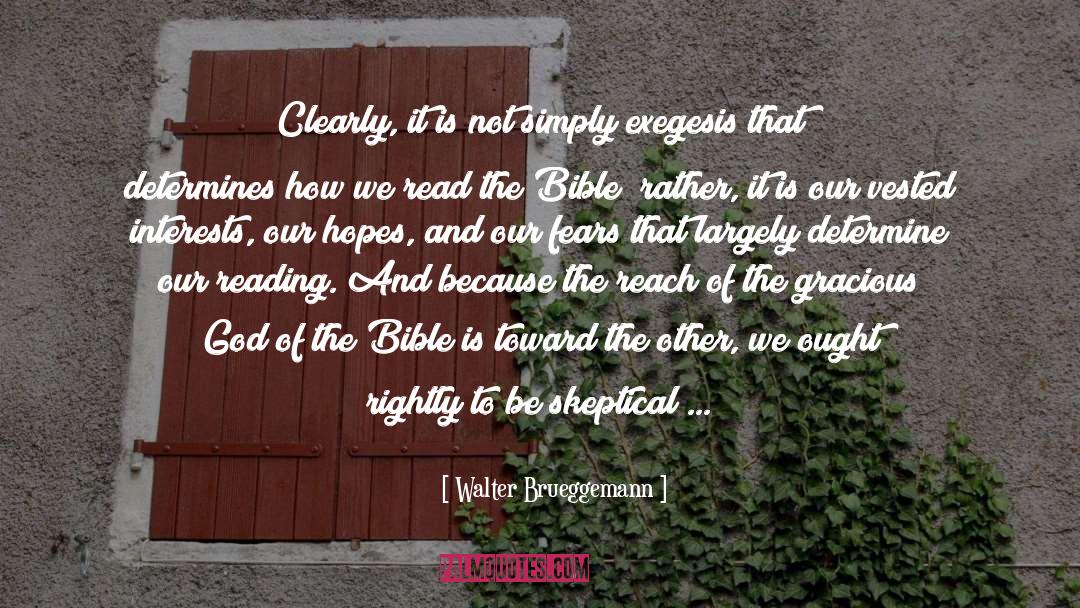
If the church is to be faithful it must be formed andordered from the inside of its experience and confession and not by borrowing from sources extenal to its own life.
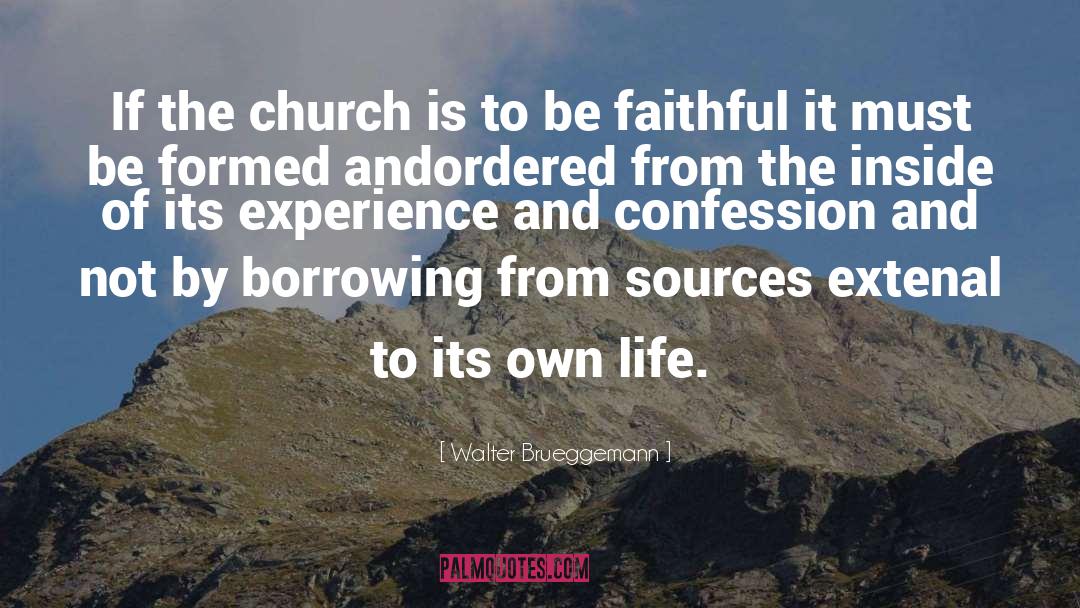
The key players, it turns out, are those who refuse to be credentialed or curbed by traditional modes of power, who understand that the transformative power of truth is not a credible companion for consolidating modes of established power, but that truth characteristically runs beyond the confines of such power.
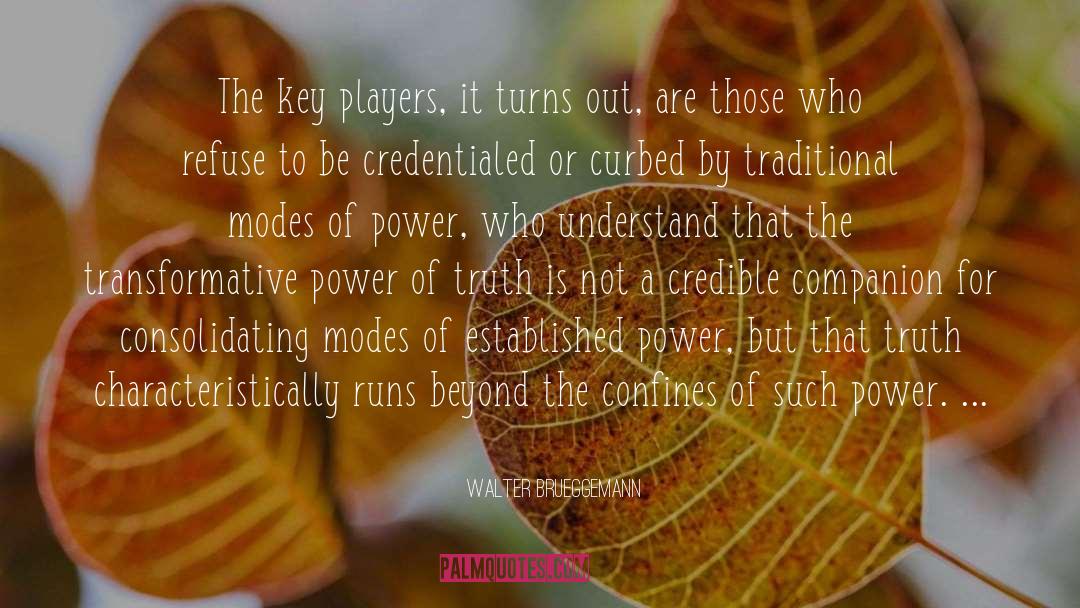
Sabbath is the celebration of life beyond and outside productivity.
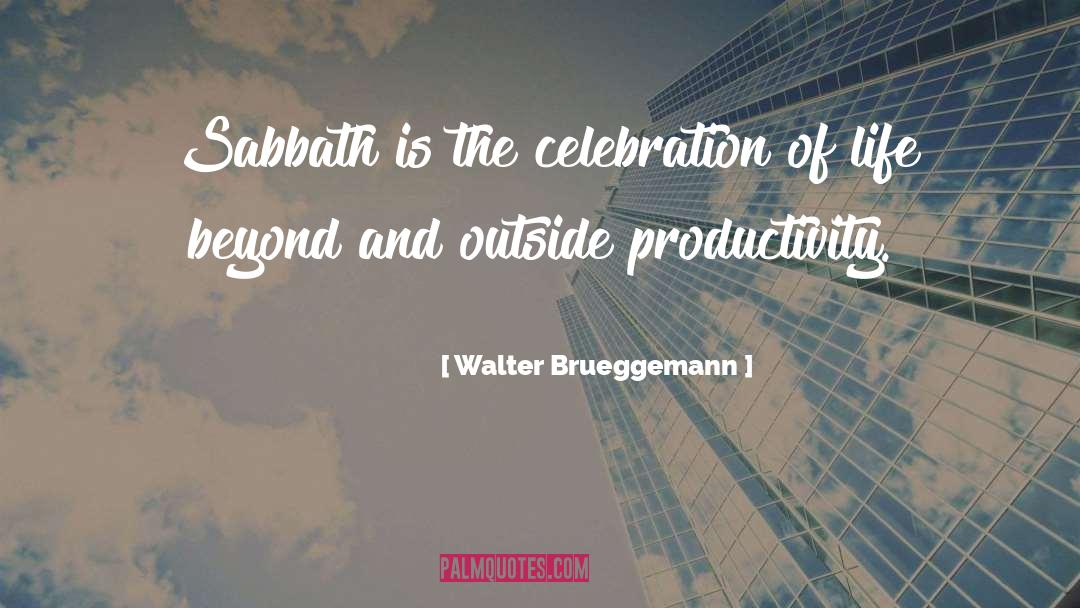
The doxology moves then to assert that Israel is forever and Yahweh's commitment to Israel is also forever. We had better approach any such doxology suspiciously.
The word "forever" is a clue word, because when it occurs we are likely dealing with state truth.23 That point would perhaps not be noticeable if Yahweh were forever. But it is the people Israel who are said to be "forever." By such a rhetorical move, the main jeopardy from the dreaded God has been removed for the dynasty. Yahweh has now been claimed as a friendly and reliable patron for the regime.
When doxology is used in the context of state truth, it has a political function. Ostensibly it enhances God, but when used as it is used here, it has a political function. Praise of God is by necessary implication praise of and legitimization of the regime. So the "foreverness" is processed as a dynastic claim. The
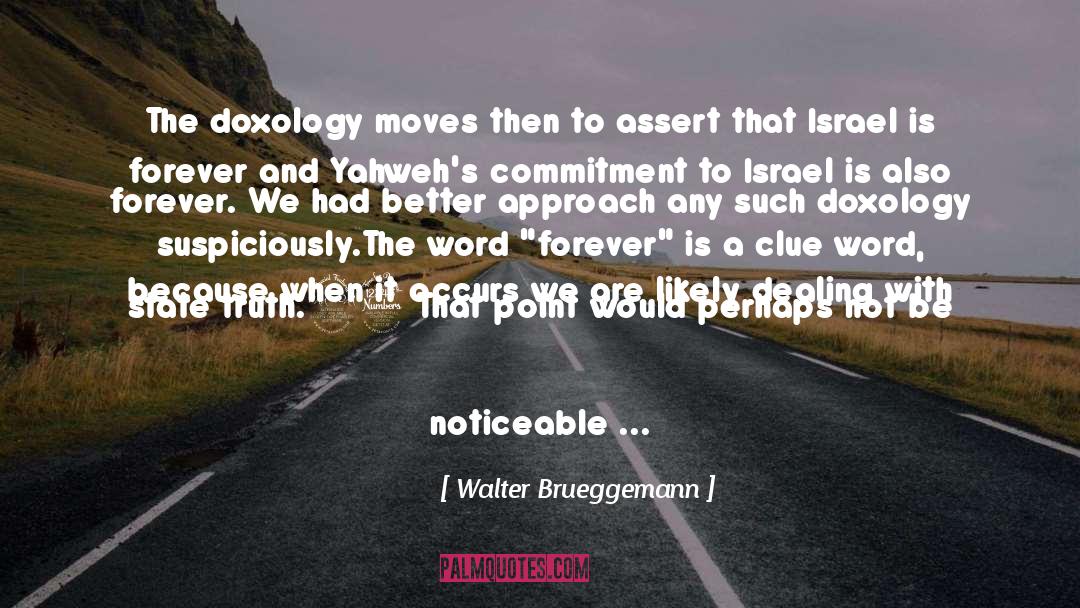
The alternative to the free market consumer culture is a set of covenants that supports neighborly disciplines, rather than market disciplines, as a producer of culture. These non-market disciplines have to do with the common good and abundance as opposed to self-interest and scarcity. This neighborly culture is held together by its depth of relatedness, its capacity to hold mystery, its willingness to stretch time and endure silence.
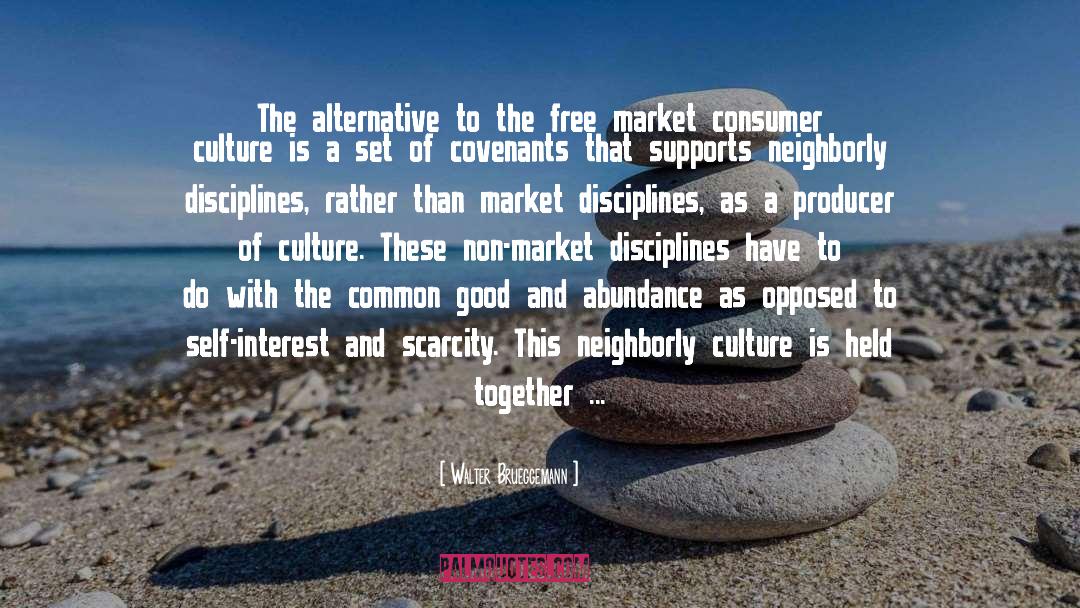
We know about your presence that fills the world, that occupies our life, that makes our life in the world true and good. We notice your powerful transformative presence in word and in sacrament, in food and in water, in gestures of mercy and practices of justice, in gentle neighbors and daring gratitude. We count so on your presence and then plunge - without intending - into your absence. We find ourselves alone, abandoned, without resources remembering your goodness, hoping your future, but mired in anxiety and threat and risk beyond our coping. In your absence we bid your presence, come again, come soon, come here: Come to every garden become a jungle Come to every community become joyless sad and numb. We acknowledge your dreadful absence and insist on your presence. Come again, come soon. Come here.

2. The second partner in the meeting is the baptized.
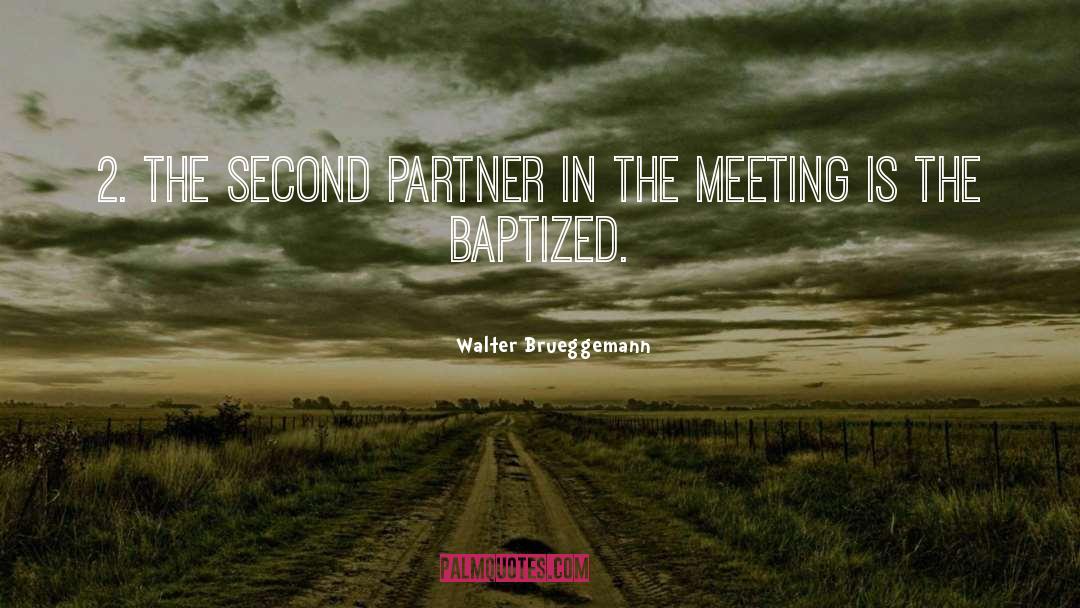
We live our lives before the wild, dangerous, unfettered and free character of the living God.
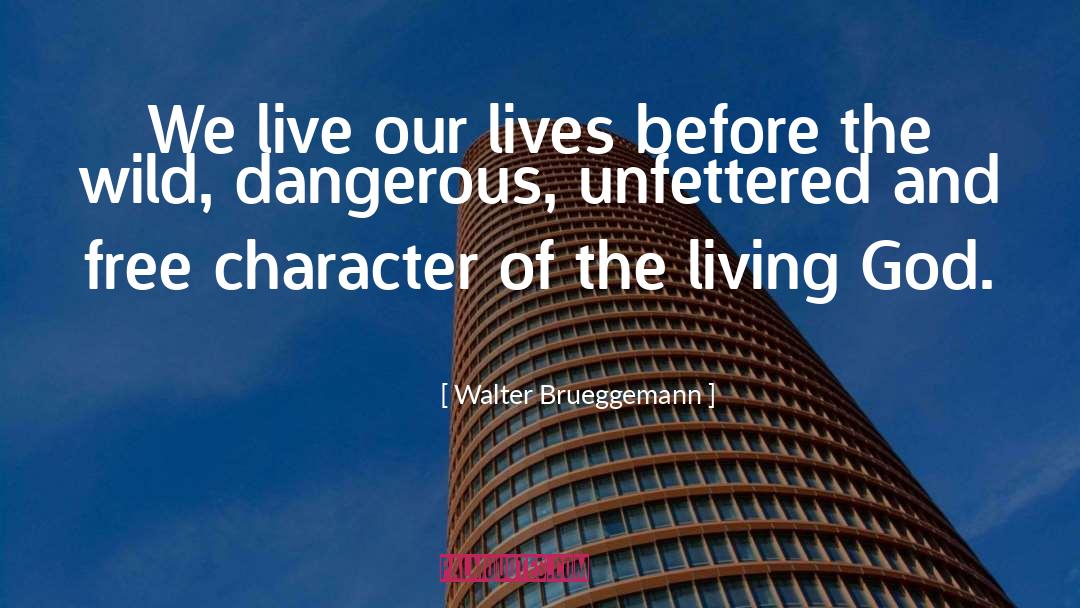
One notices immediately that the First Book of Samuel is mostly ignored by the Chronicler. This truth of the assembly does not want to go back to the rawness of the tribe. It is content to live from the state, and it is glad for the lid that state truth has put upon the tribal versions that might contain embarrassments. The beginning point is only to give a favorable version of the transition. The first narrative disposes of Saul by telling of the suicide. The narrative is crafted so that David is not mentioned, and therefore could not be blamed, until v. 14.

The Israeli-Palestinian conflict cannot be resolved until the human rights of the other are recognized and guaranteed.
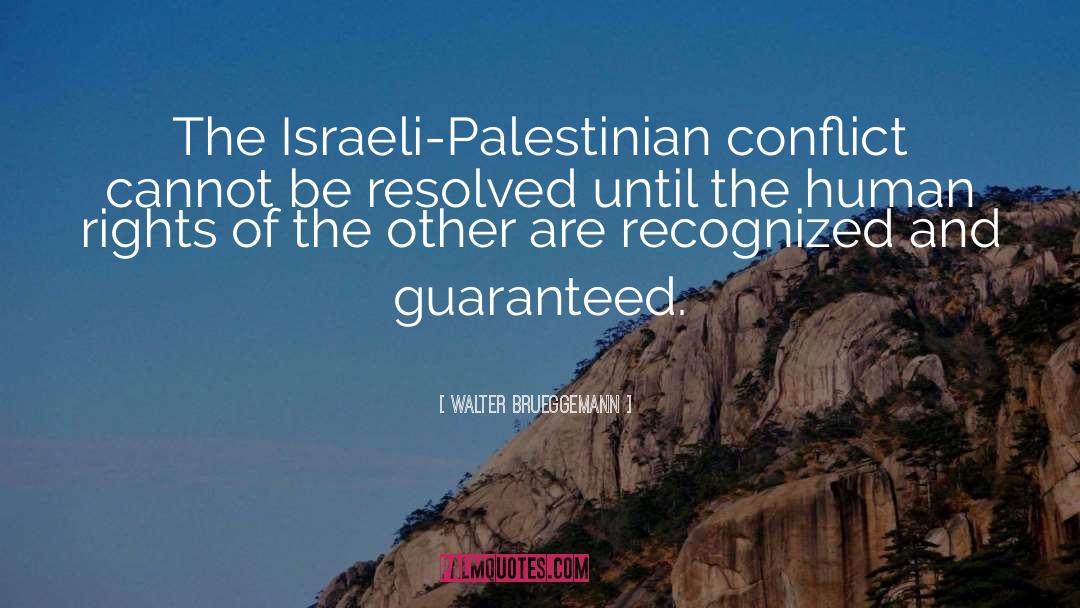
Those who participate in [sabbath] break the anxiety cycle. They are invited to awareness that life does not consist in frantic production and consumption that reduces everyone else to threat and competition.
![Walter Brueggemann Quotes: Those who participate in [sabbath] Walter Brueggemann Quotes: Those who participate in [sabbath]](https://palmquotes.com/author/walter-brueggemann-quotes-74981.jpg)
Relationship with God is not immune to the surprises and costs of our daily life.
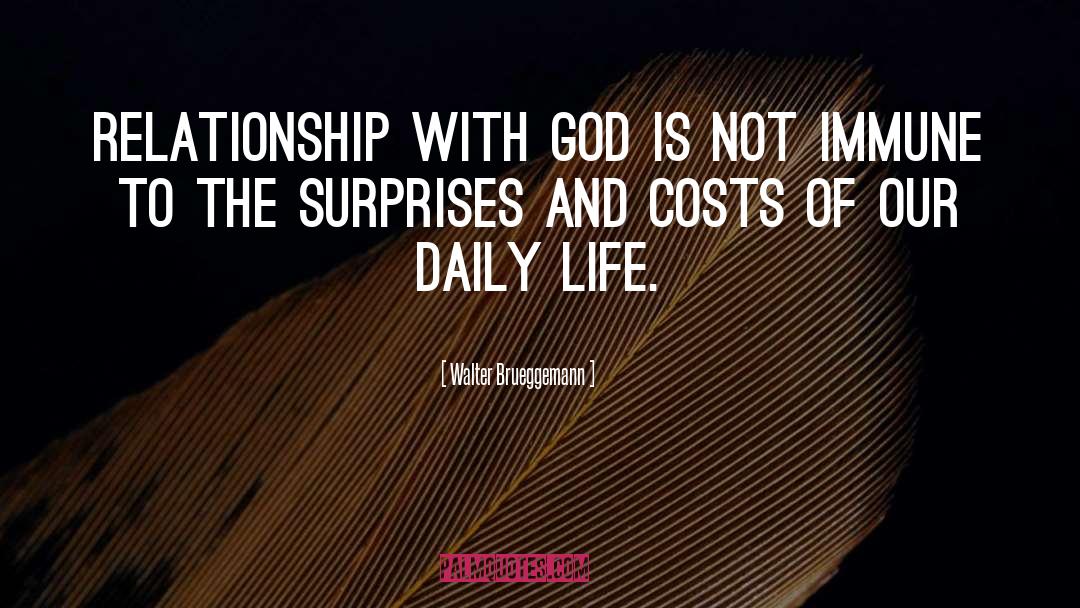
There are many pressures to quiet the text, to silence this deposit of dangerous speech, to halt this outrageous practice of speaking alternative possibility. The poems, however, refuse such silence. They will sound. They sound through preachers who risk beyond prose. In the act of such risk, power is released, newness is evoked, God is praised. People are "speeched" to begin again. Such new possibility is offered in daring speech. Each time that happens, "finally comes the poet"-finally.
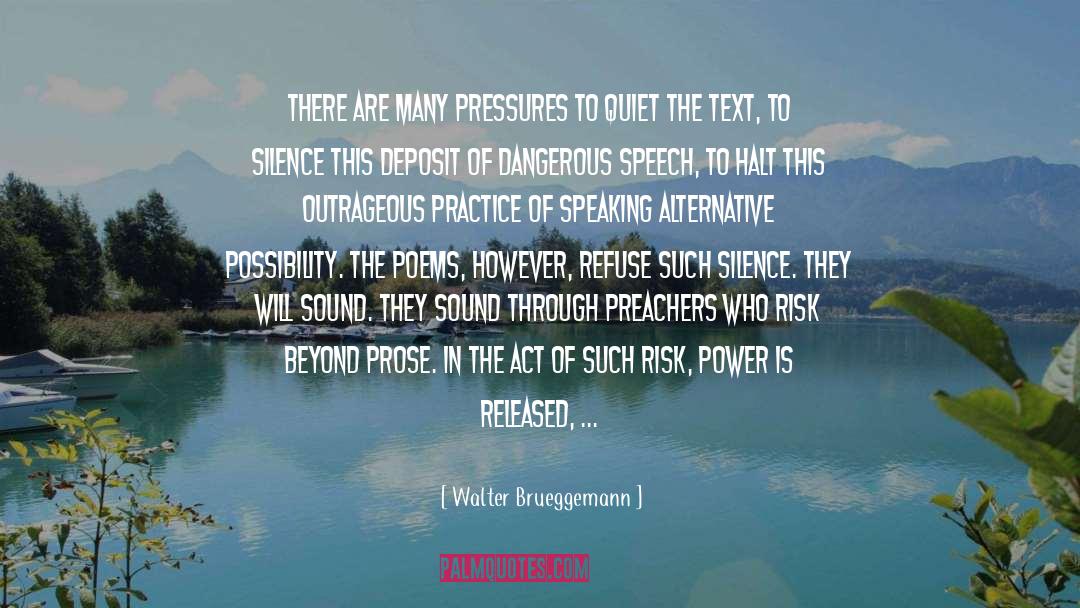
A concrete embodiment of the jubilee commandment was evidenced in a rural church in Iowa during the "farm crisis." The banker in the town held mortgages on many farms. The banker and the farmers belonged to the same church. The banker could have foreclosed. He did not because, he said, "These are my neighbors and I want to live here a long time." He extended the loans and did not collect the interest that was rightly his. The pastor concluded, "He was practicing the law of the Jubilee year, and he did not even know it." The pastor might also have noted that the reason the banker could take such action is that his bank was a rare exception. It was locally and independently owned, not controlled by a larger Chicago banking system.
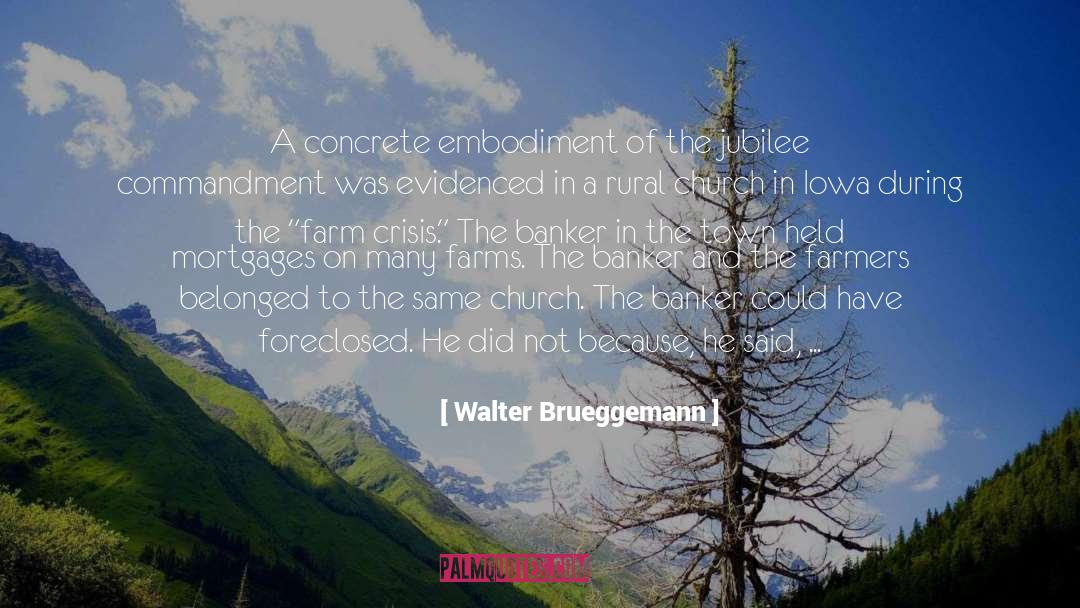
There are buoyant powers of healing at work in the world that do not depend on us, that we need not finance or keep functioning and that are not at our disposal.
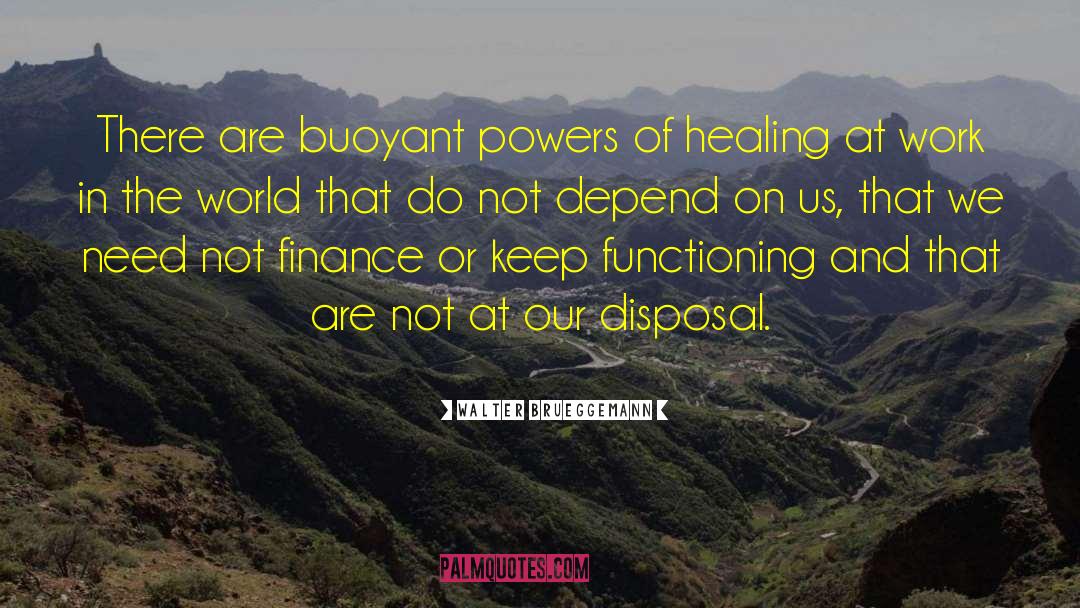
The church will not have power to act or believe until it recovers its tradition of faith and permits that tradition to be the primal way out of enculturation.
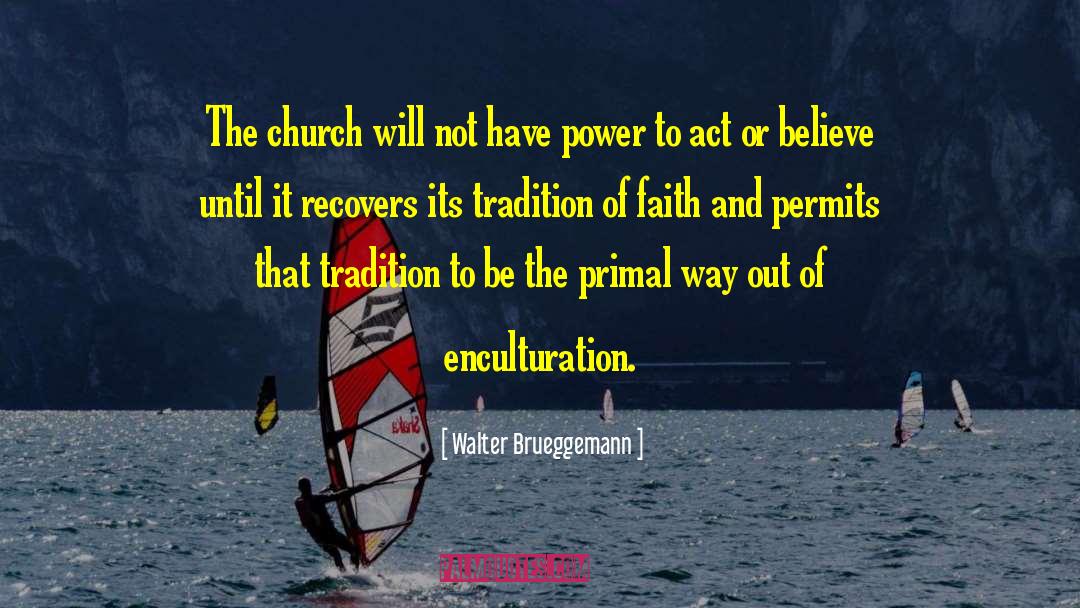
Grief is an element of aliveness and the answer to the denial the market demands of us. It is an index of our humanity. It is proof of the presence of our relatedness to each other. It is a communal practice that recognizes that choosing the wilderness of vulnerability, mystery, and anxiety was a good and life-affirming choice.
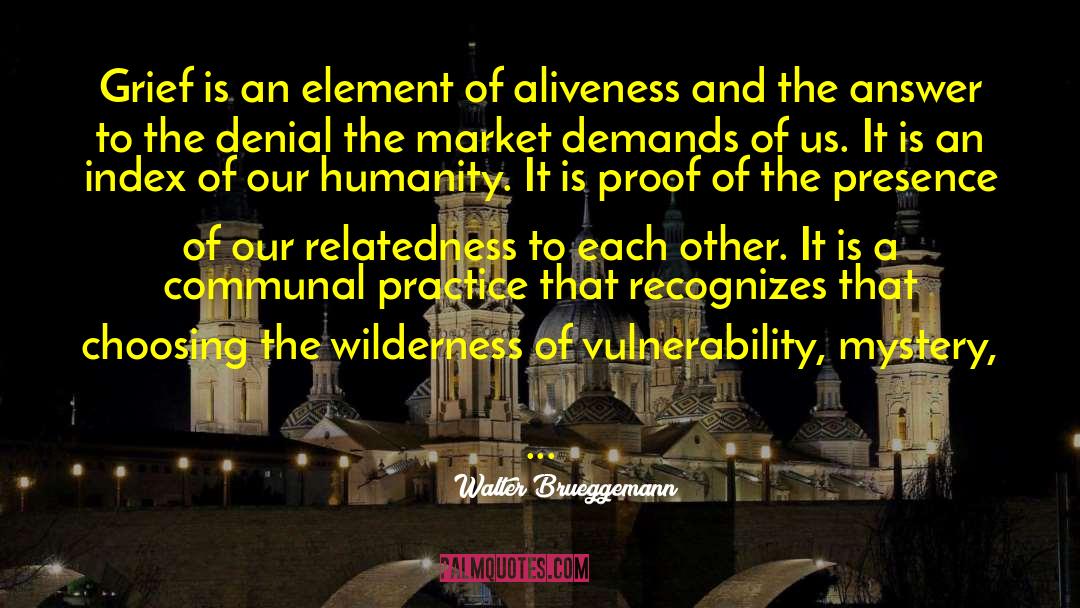
Sabbath becomes a decisive, concrete, visible way of opting for and aligning with the God of rest.
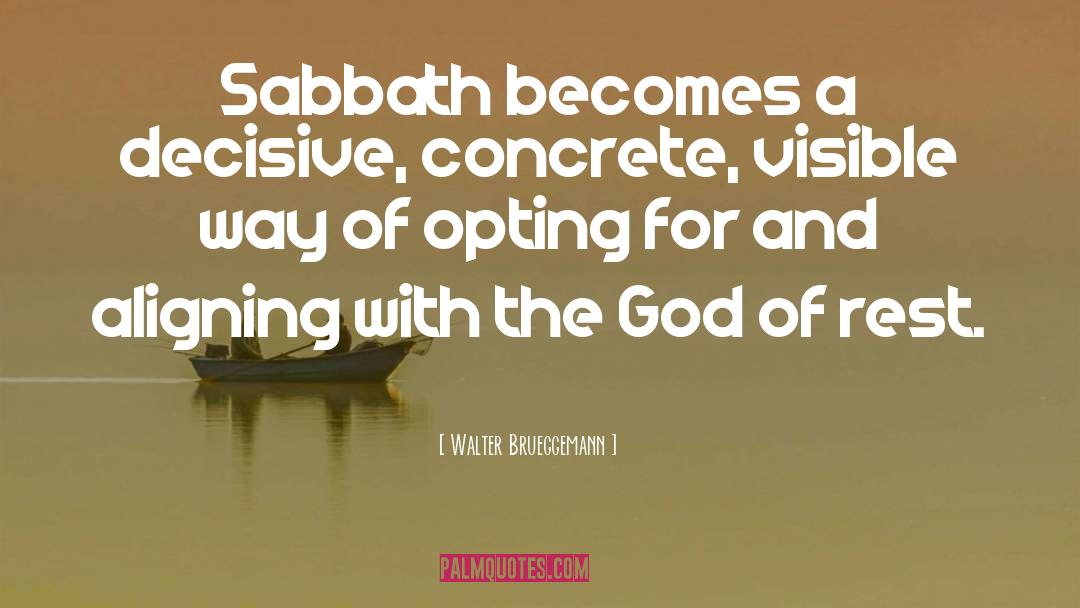
Worship that does not lead to neighborly compassion and justice cannot be faithful worship of YHWH. The offer is a phony Sabbath!
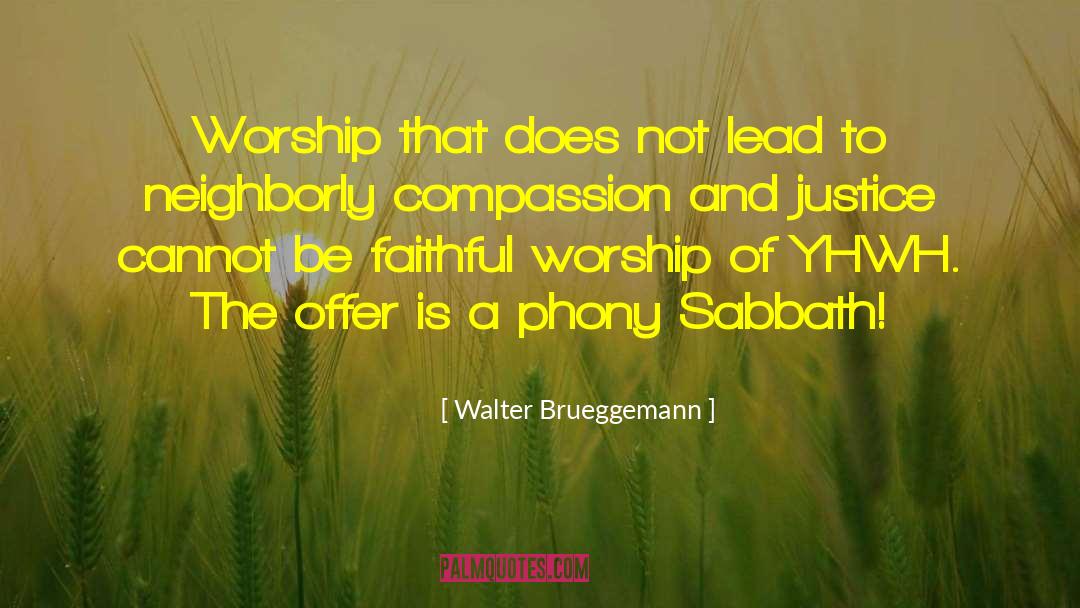
The fact that Jesus weeps and that he is moved in spirit and troubled contrasts remarkably with the dominant culture. That is not the way of power, and it is scarcely the way among those who intend to maintain firm social control. But in [John 11:33-35] Jesus is engaged not in social control but in dismantling the power of death, and he does so by submitting himself to the pain and grief present in the situation, the very pain and grief that the dominant society must deny.
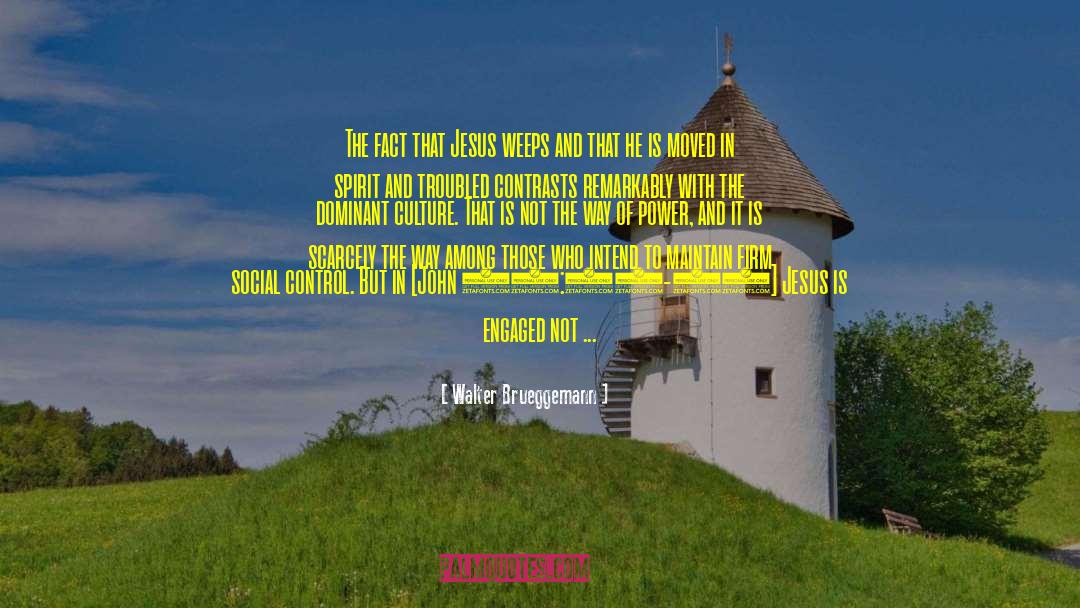
Thus I suggest that prophetic ministry has to do not primarily with addressing specific public crises but with addressing, in season and out of season, the dominant crisis that is enduring and resilient, of having our alternative vocation co-opted and domesticated.
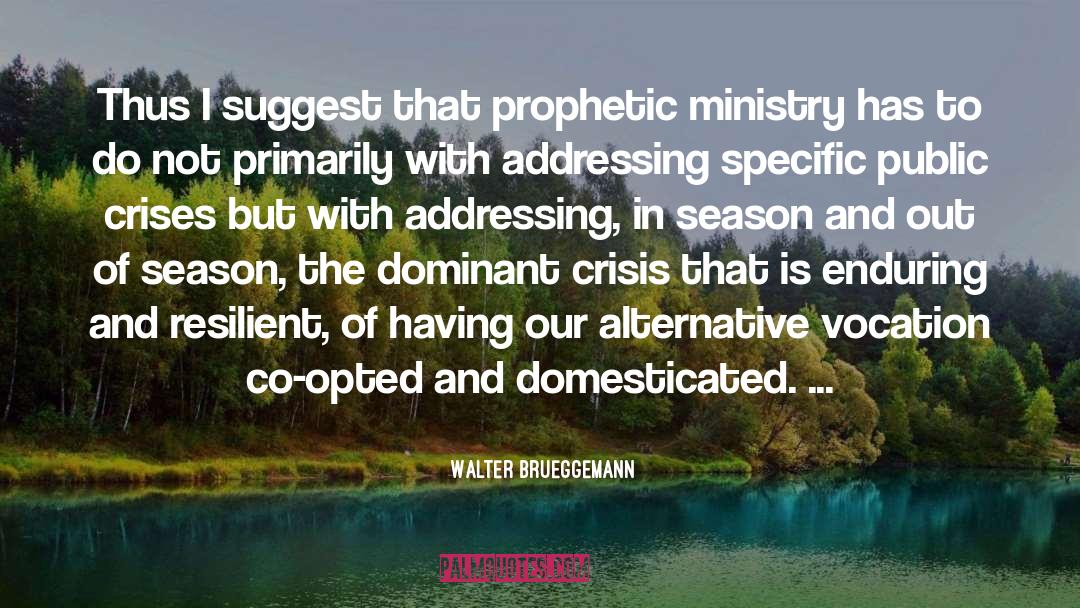
Moses knows that prosperity breeds amnesia.
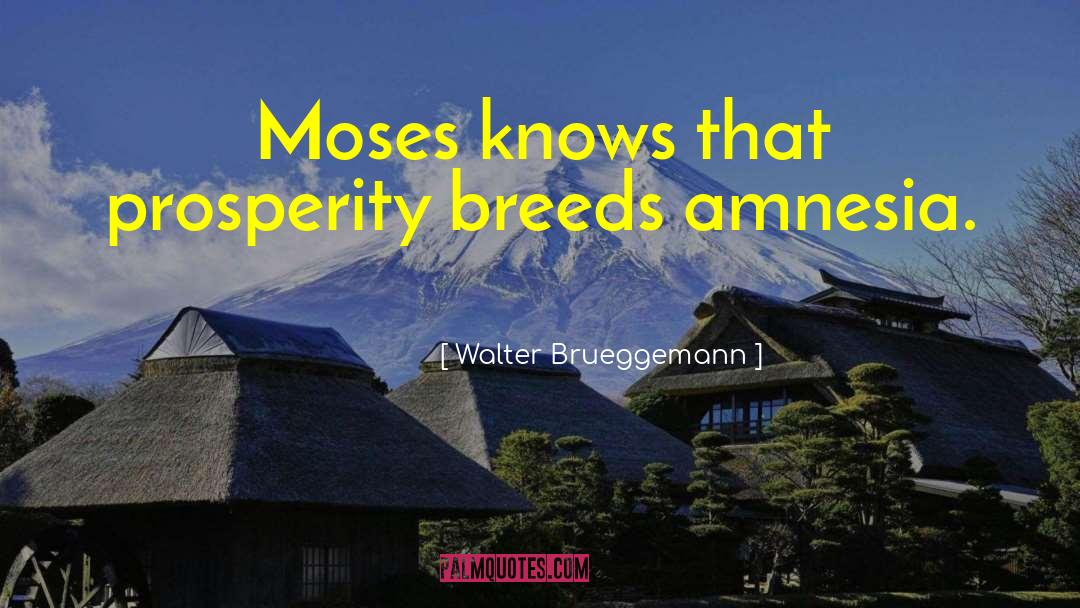
The emancipatory gift of YHWH to Israel is contrasted with all the seductions of images. The memory of the exodus concerns the God of freedom who frees.
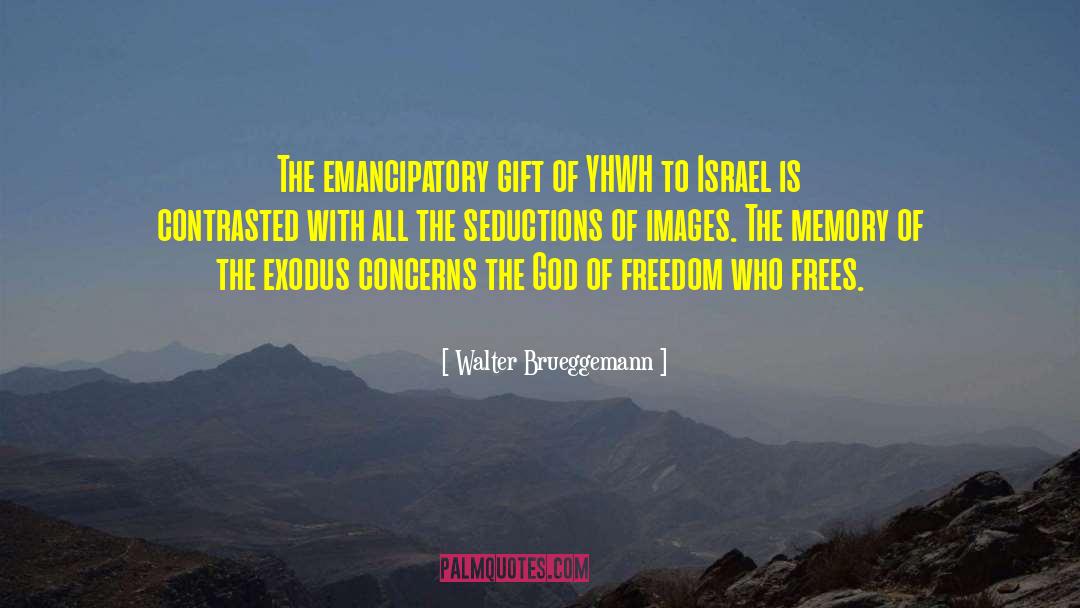
Such utterance staggers and offends among the listeners. But it also opens vistas of possibility where we had not thought to go and where in fact, we are most reluctant to go.
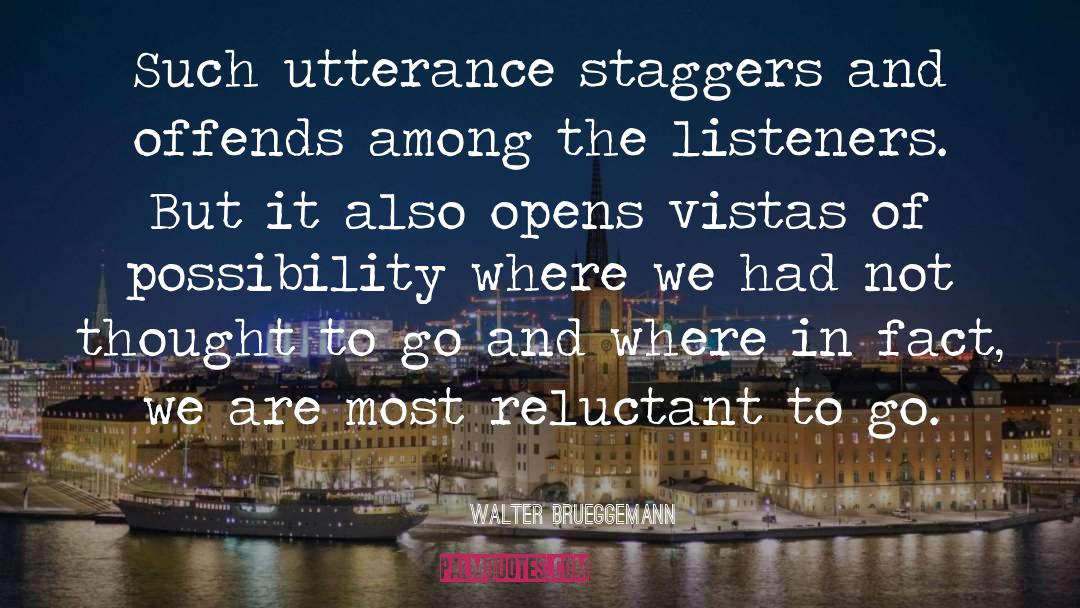
As a result, legitimate indignation is regularly siphoned away from speech with God to be acted out in other, perhaps more destructive ways. Such speech of rage addressed to YHWH is credible only when the worshiping community has confidence that the covenant God addressed is both willing and able to intervene in contexts of unbearable suffering.
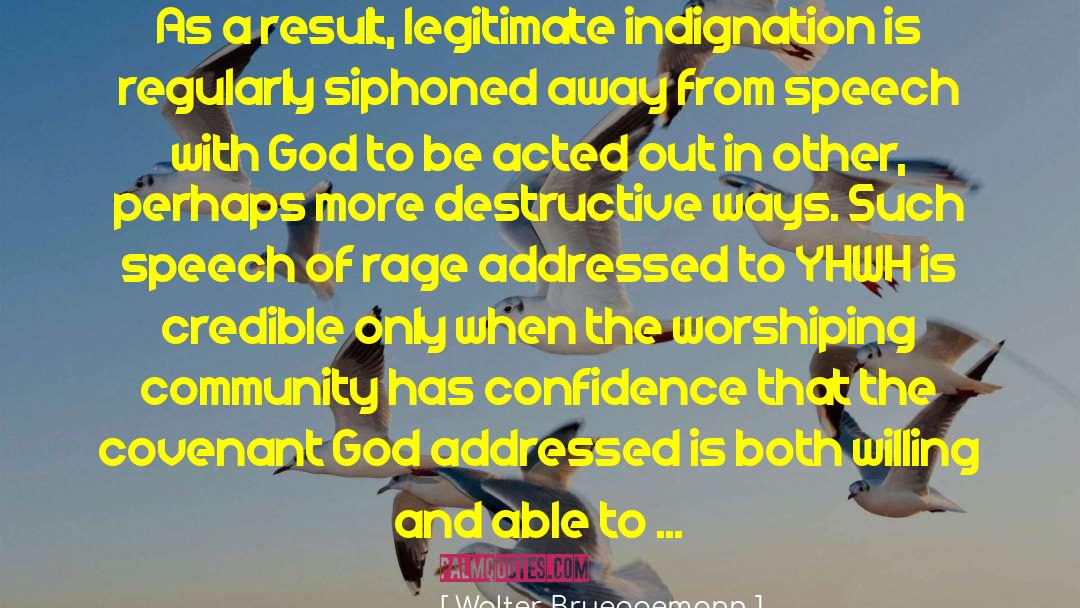
Hope does not need to silence the rumblings of crisis to be hope.
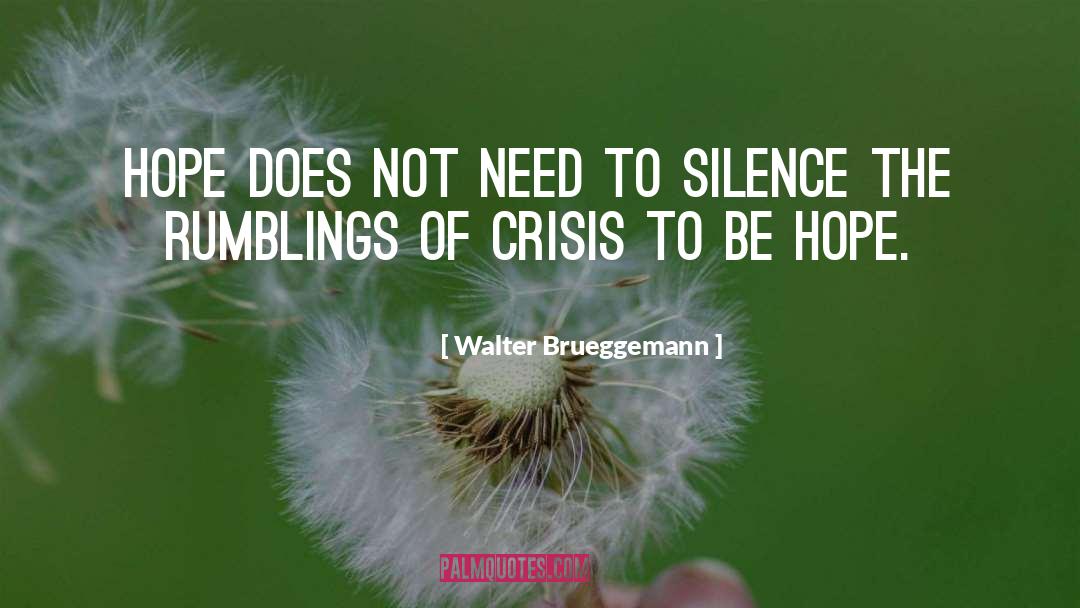
If we construct an economy where quantities are controlled, based on the belief there is never enough for all, then we must compete to determine the winners. We begin this with grades in the first grade. There is the presumption that competition is essential and so there must be a normal distribution of grades. All students cannot receive high marks. If I get an A, someone in the class must perform poorly. It is an early lesson in how the marketplace ideology works. In a community organized around abundance, competition will occur, but it is not built into the system as a core design element. In a neighborly culture, the abundance of resources becomes the design element
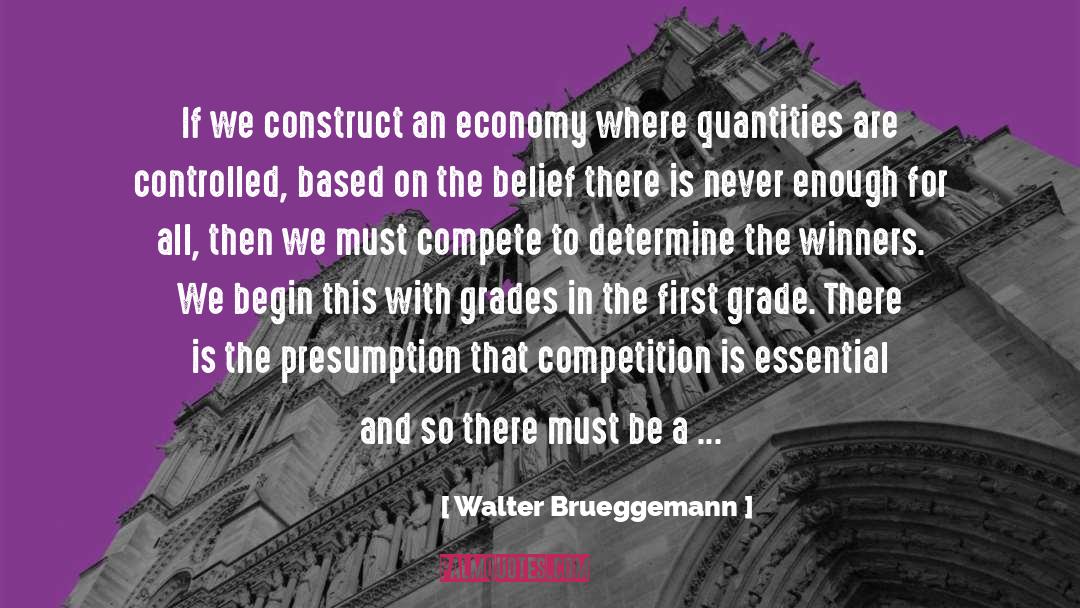
The two commandments go beneath social performance and social appearance to the deep, elemental, defining issue of God versus the gods.
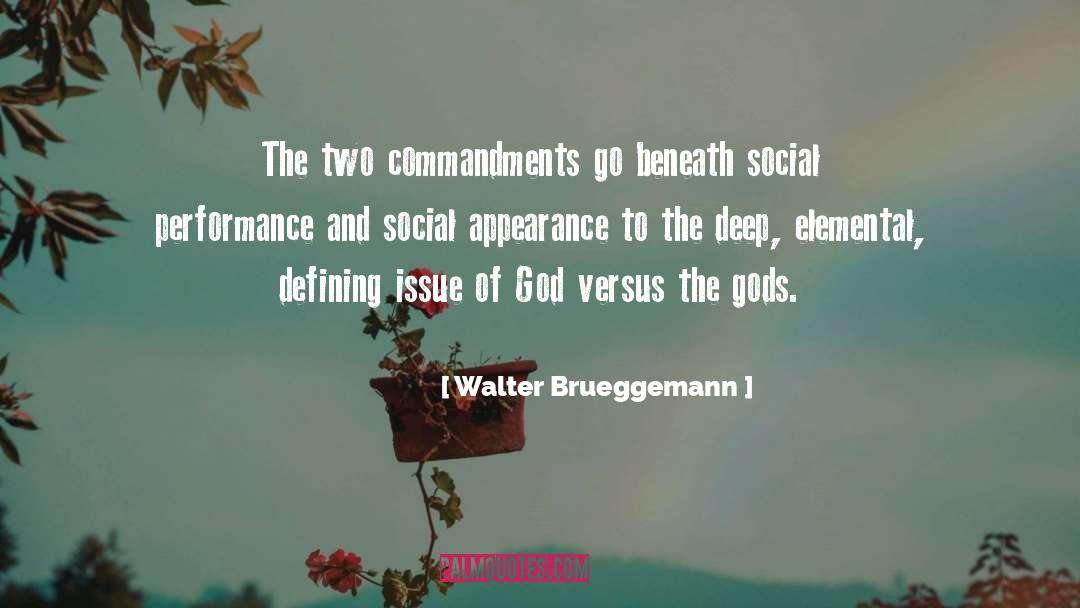
Sabbath is the practice of letting life rest safely in God's hand.41
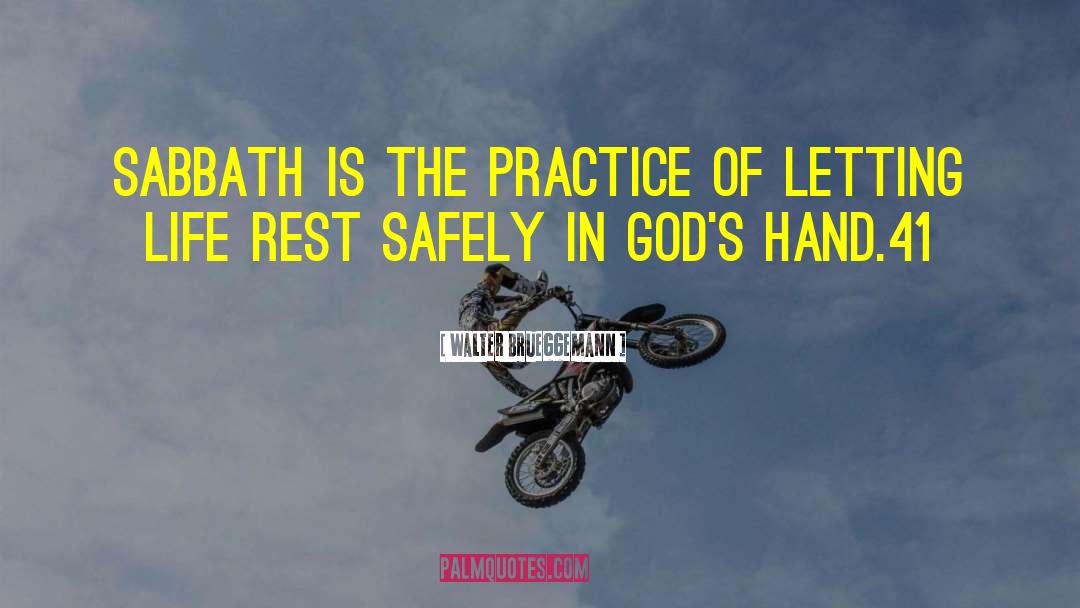
Our public life is largely premised on an exploitation of our common anxiety. The advertising of consumerism and the drives of the acquisitive society, like he serpent, seduce into believing there are securities apart from the reality of God.
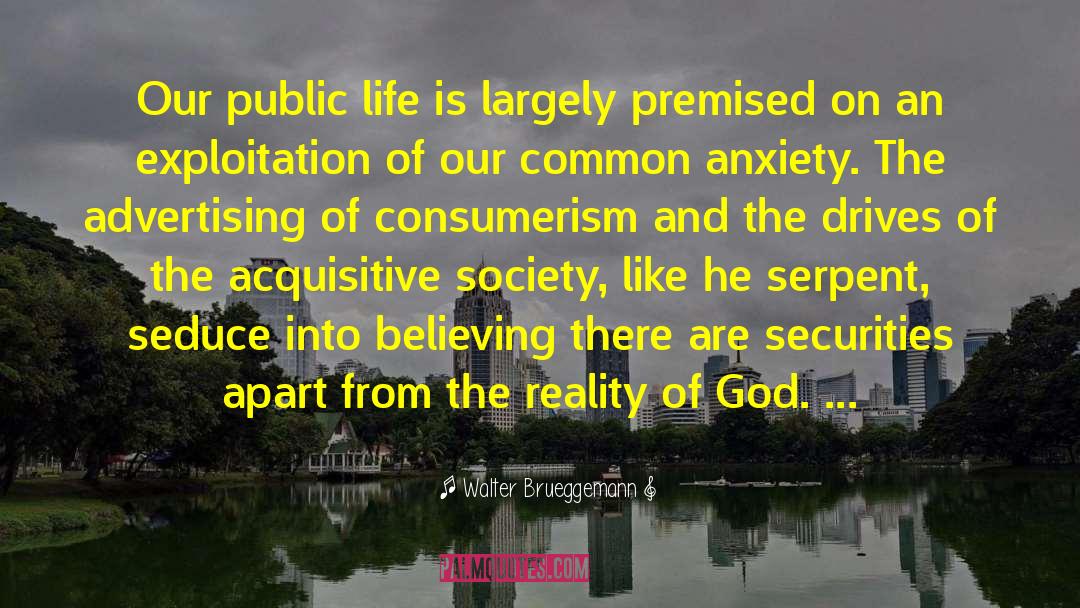
Buechner uses words with such transformative power that any comment on them is like the moon palely reflecting the sun.
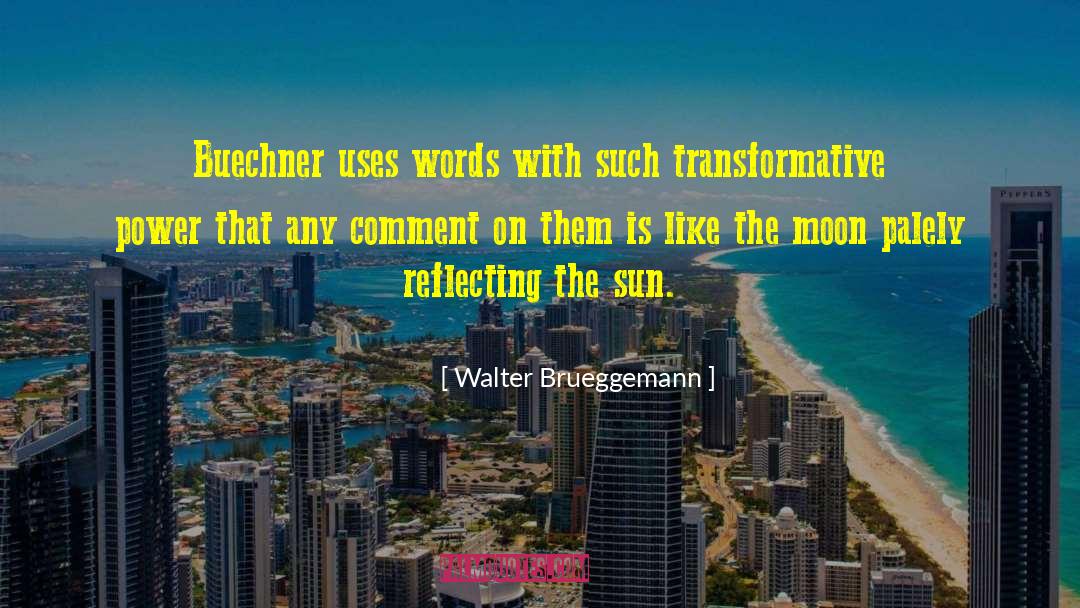
The outcome is to delegitimize and deconstruct the kings in effective ways in order to show that while they occupy the forms of power, they lack the substance of power.
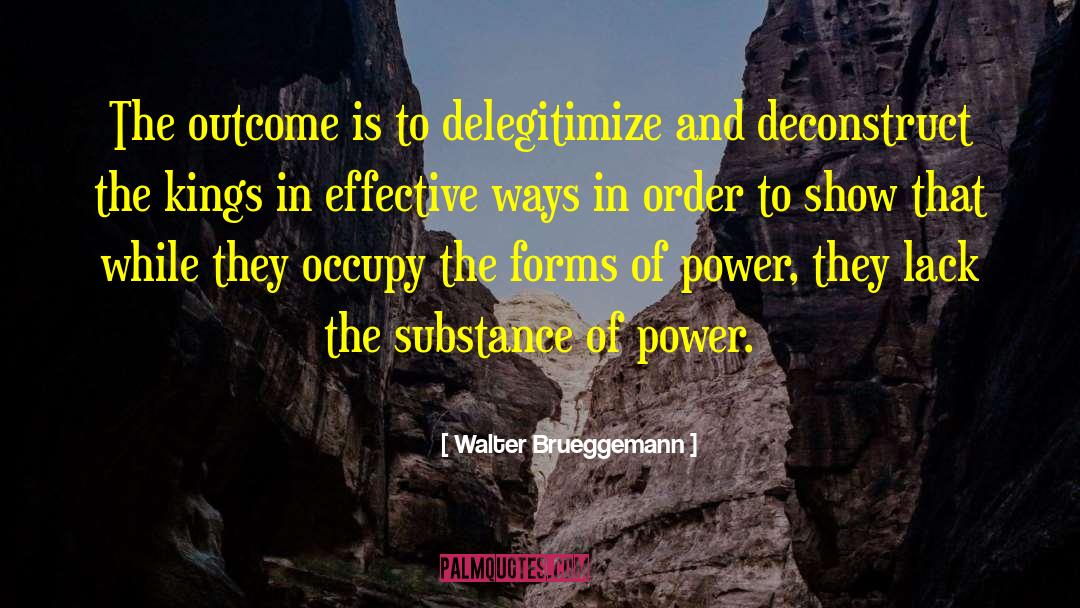
The cross is the assurance that effective prophetic criticism is done not by an outsider but always by one who must embrace the grief, enter into the death, and know the pain of the criticized one.
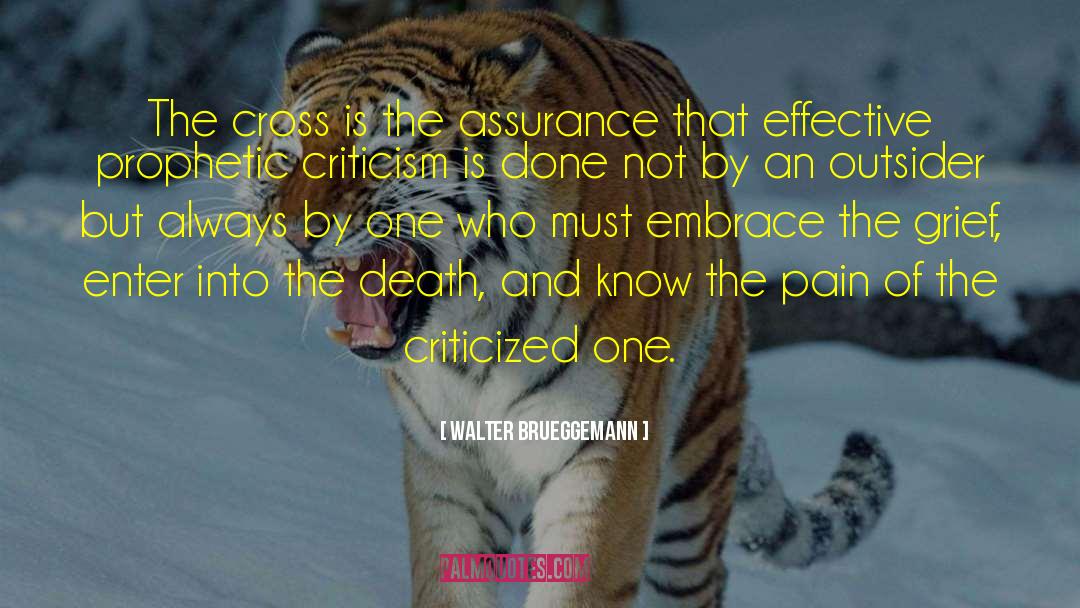
2. After God notices the truth about us (voiced by the poet), God responds to that truth. The poem of Jeremiah 5 continues with a presentation of God's response. The taxonomy of guilt and healing includes two dimensions of God's response to the reality of sin and guilt. First there is God's wrath, indignation, and anger.
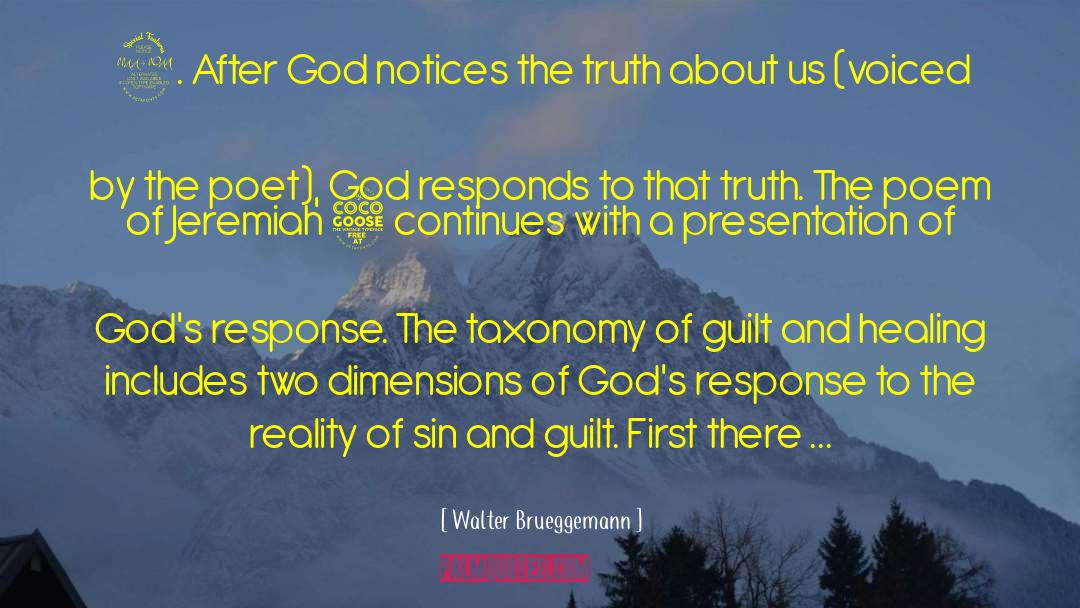
Two movements in human life are important: (a) deep reluctance to let loose of a world that has passed away, and (b) capacity to embrace a new world being given.
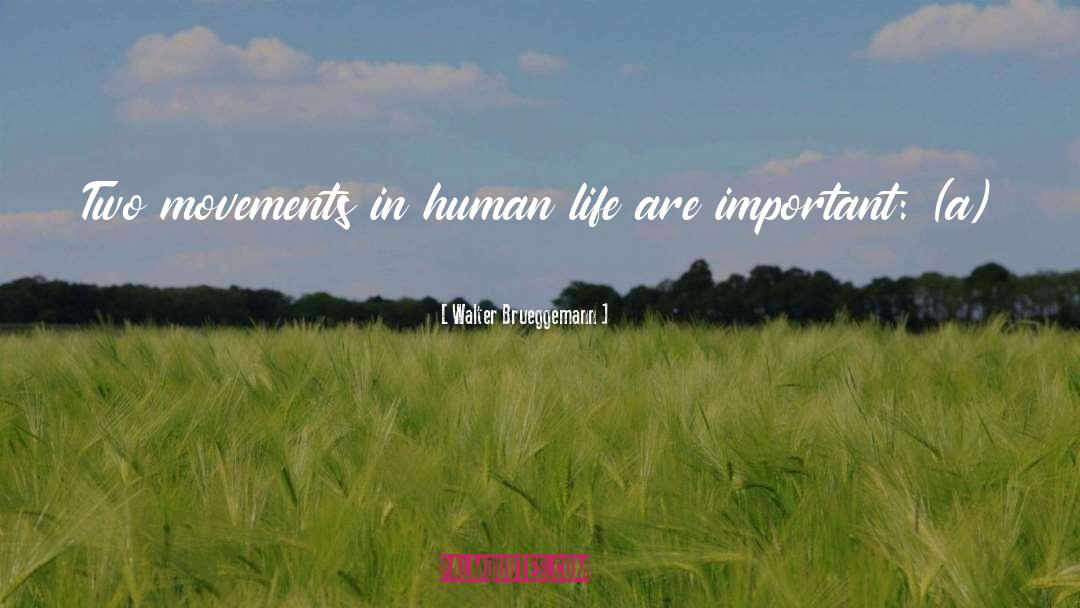
The Exile In July 587 BCE, Babylonian soldiers broke through Jerusalem's walls, ending a starvation siege that had lasted well over a year. They burned the city and Solomon's temple and took its king and many other leaders to Babylon as captives, leaving others to fend for themselves in the destroyed land. Many surrounding countries disappeared altogether when similar disasters befell them. But Judah did not. Instead, the period scholars most often call the "Babylonian exile" inspired religious leaders to revise parts of Scripture that had been passed down to them. It also sparked the writing of entirely new Scriptures and the revision of ideas about God, creation, and history. Much of what is called the Hebrew Scriptures or Old Testament was written, edited, and compiled during and after this national tragedy.
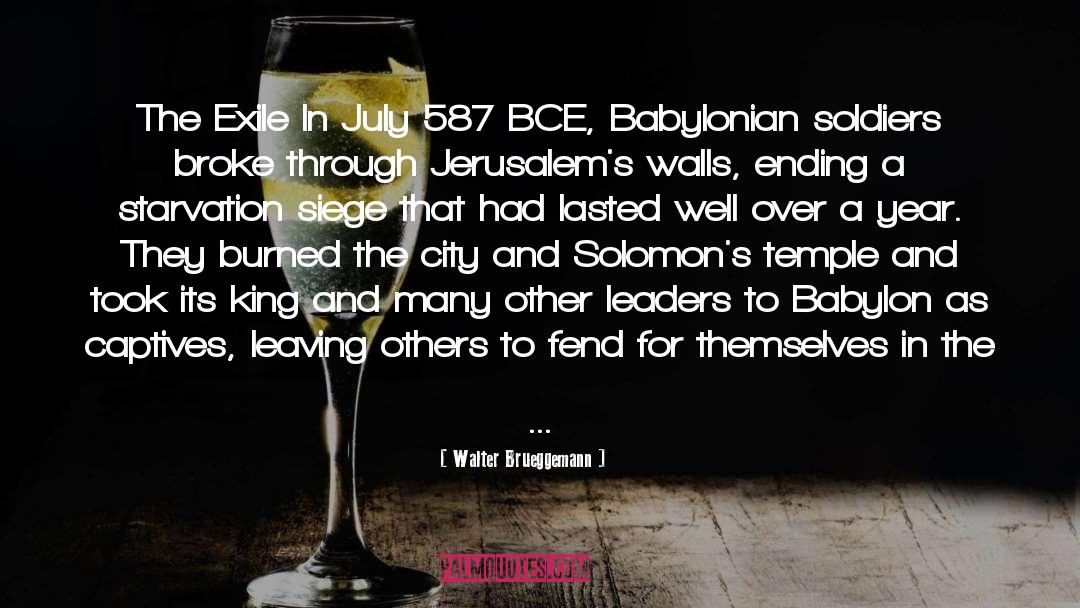
It takes no great imagination to see that this picture of David is drastically different from the portrayals given in the Samuel traditions. It is not hard to see that such a constructed picture of David surely serves the context of the fifth century and no doubt serves the specific claims of the Levitic priesthood. The truth about David given here is that David is a pious, cultic man who finds his life shaped and enhanced by such explicit religious commitment. He is indeed a man of the assembly.
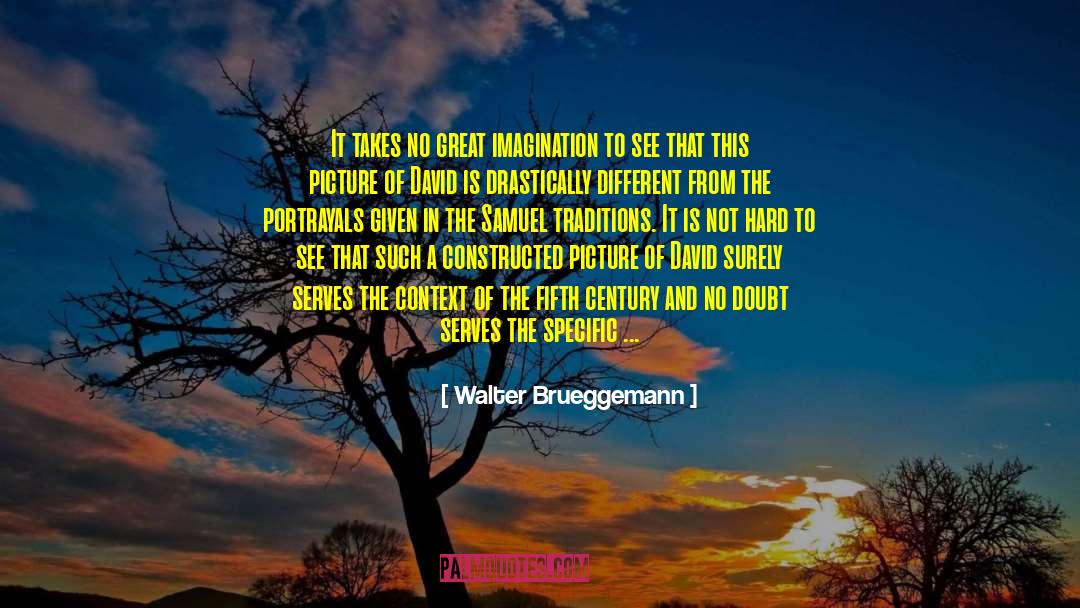
Every uncompromising ideology reduces faith to an idolatry,
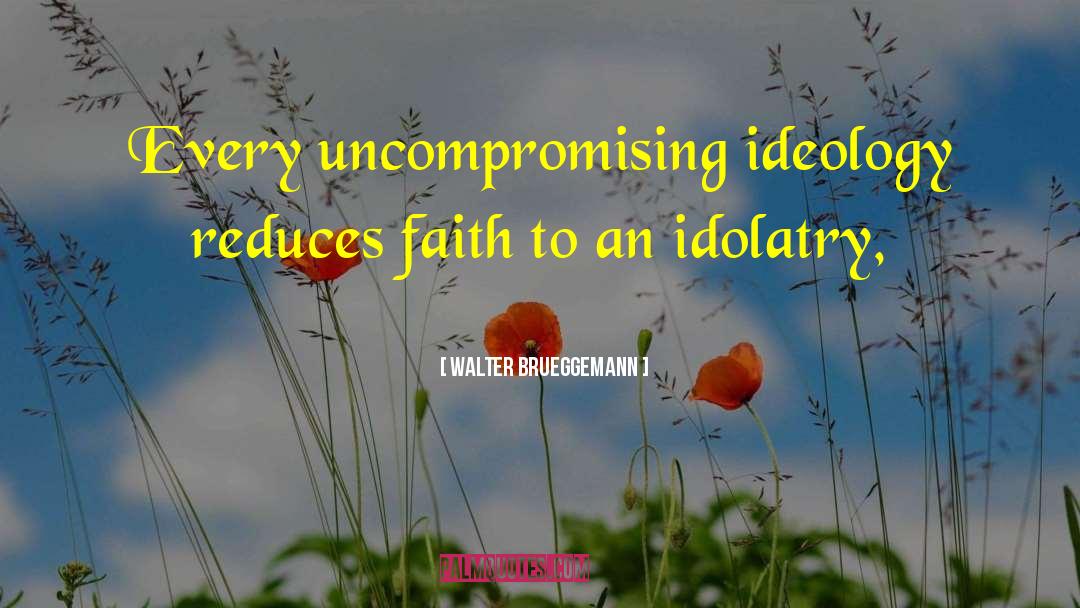
Prophecy in this context may be understood as a redescription of the public processes of history through which the purposes of Yahweh are given in human utterance.

Prophecy cannot be separated very long from doxology, or it will either wither or become ideology. Abraham
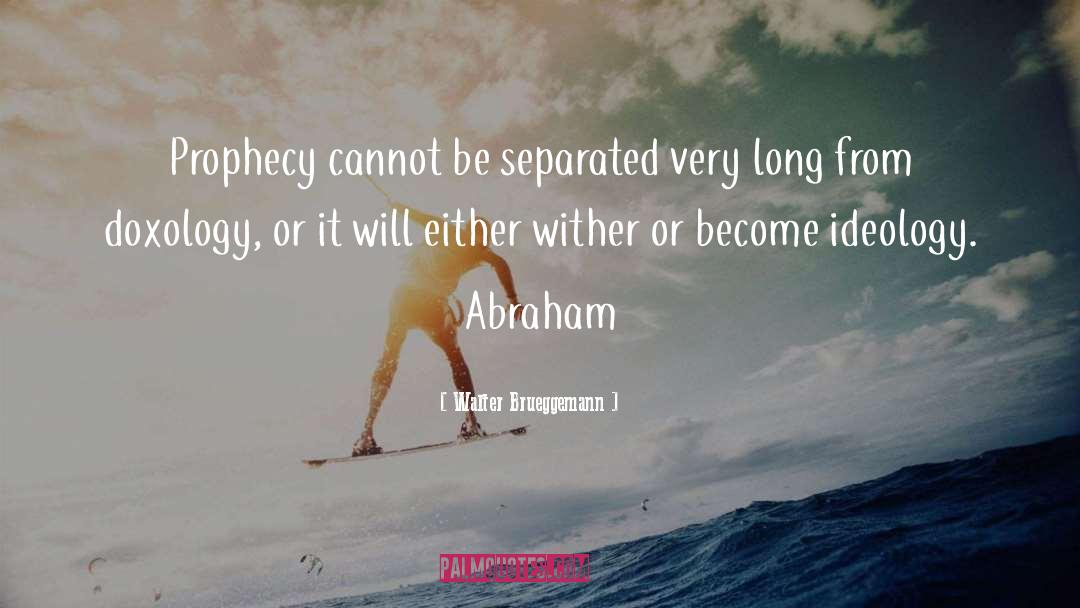
The Sabbath, along with the other practices he exposits, concerns the maintenance of a distinct faith identity in the midst of a culture that is inhospitable to all distinct identities in its impatient reduction of all human life to the requirements of the market.
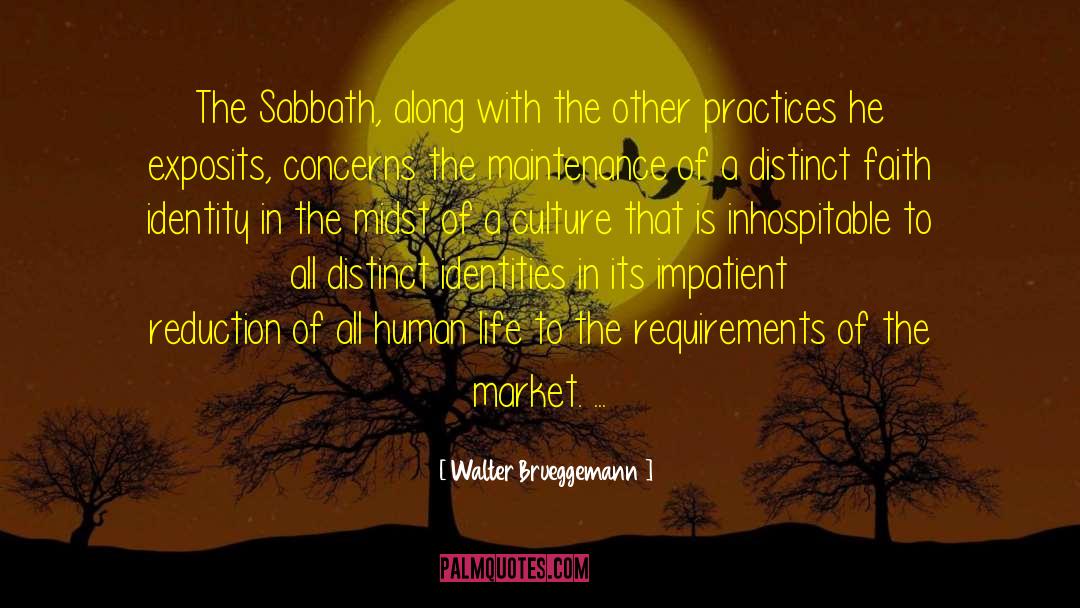
The withdrawal of the king from the narrative exposes the king as an irrelevance. The one with all the power can do nothing to save. Because it is only my God who saves.
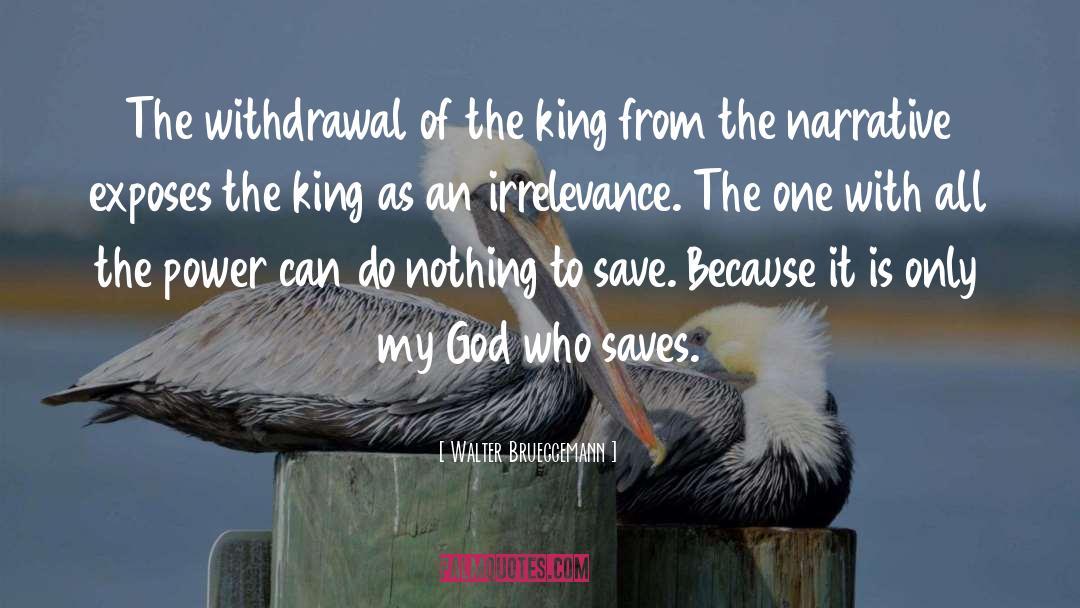
Thus I have come to think that the fourth commandment on sabbath is the most difficult and most urgent of the commandments in our society, because it summons us to intent and conduct that defies the most elemental requirements of a commodity-propelled society that specializes in control and entertainment, bread and circuses ... along with anxiety and violence.
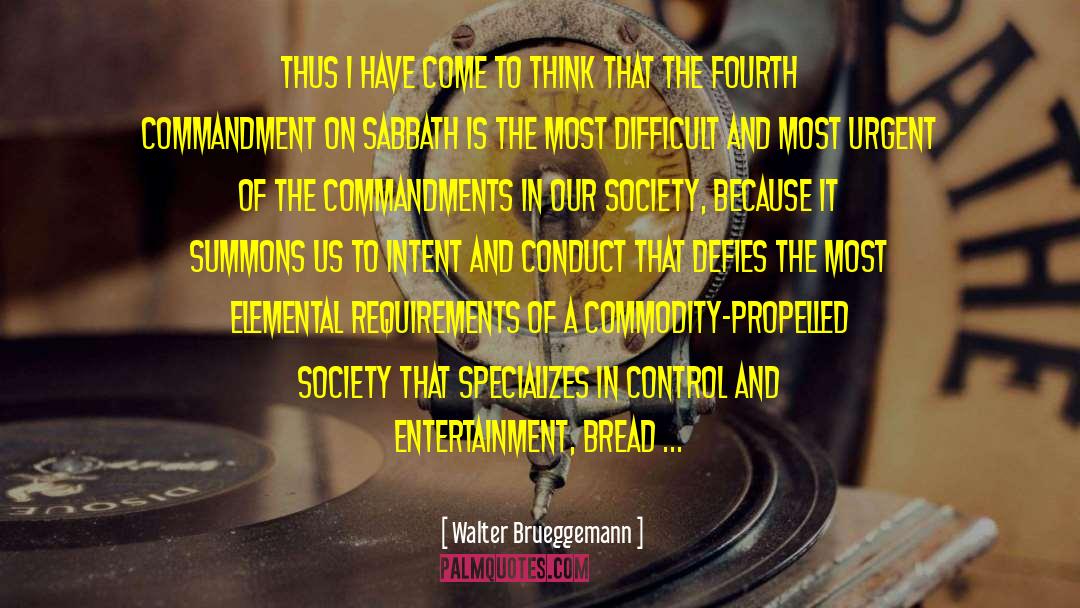
The most remarkable observation one can make about this interface of exilic circumstance and scriptural resource is this: Exile did not lead Jews in the Old Testament to abandon faith or to settle for abdicating despair, nor to retreat to privatistic religion. On the contrary, exile evoked the most brilliant literature and the most daring theological articulation in the Old Testament.
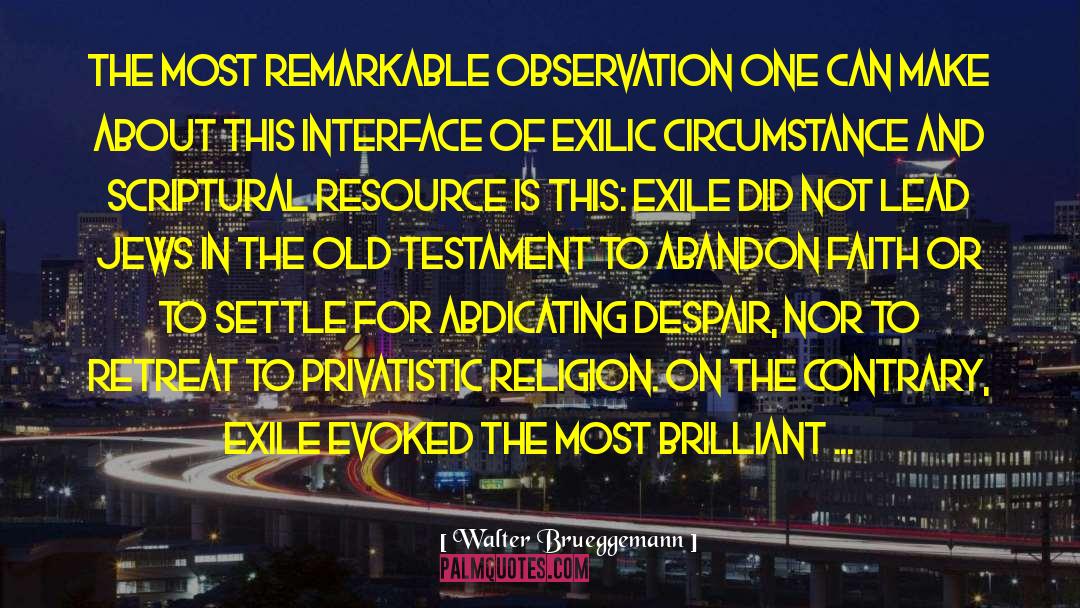
We pray because our life comes from God and we yield it back in prayer. Prayer is a great antidote to the illusion that we are self-made.
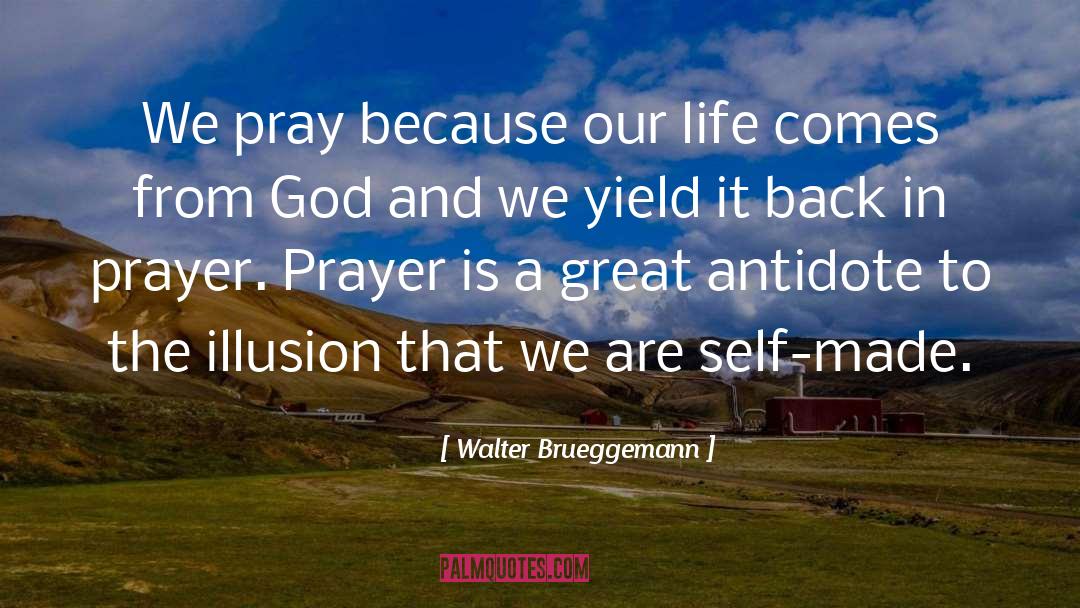
Pharaoh is clearly a metaphor. He embodies and represents raw, absolute, worldly power. He is, like Pilate after him, a stand-in for the whole of the empire. As the agent of the "empire of force," he reappears in many different personae.9
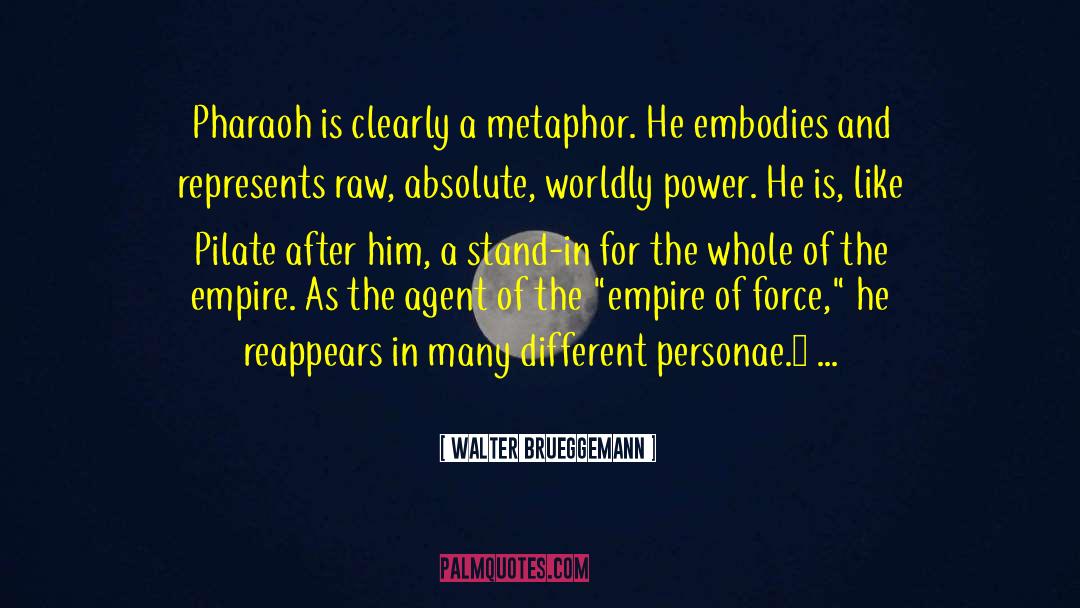
The power of the future lies not in the hands of those who believe in scarcity but of those who trust God's abundance.
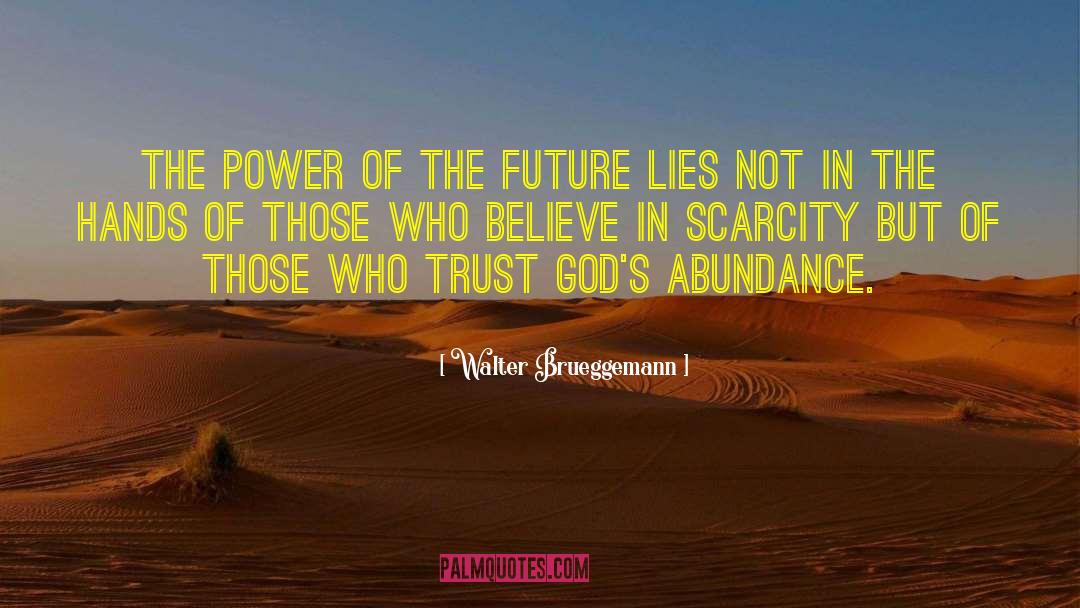
Every imperial agent wants to reduce what is possible to what is available.

When we live according to our fears and our hates, our lives become small and defensive, lacking the deep, joyous generosity of God. If you find some part of your life where your daily round has grown thin and controlling and resentful, life with God is much, much larger, shattering our little categories of control, permitting us to say that God's purposes led us well beyond ourselves to live and to forgive, to create life we would not have imagined
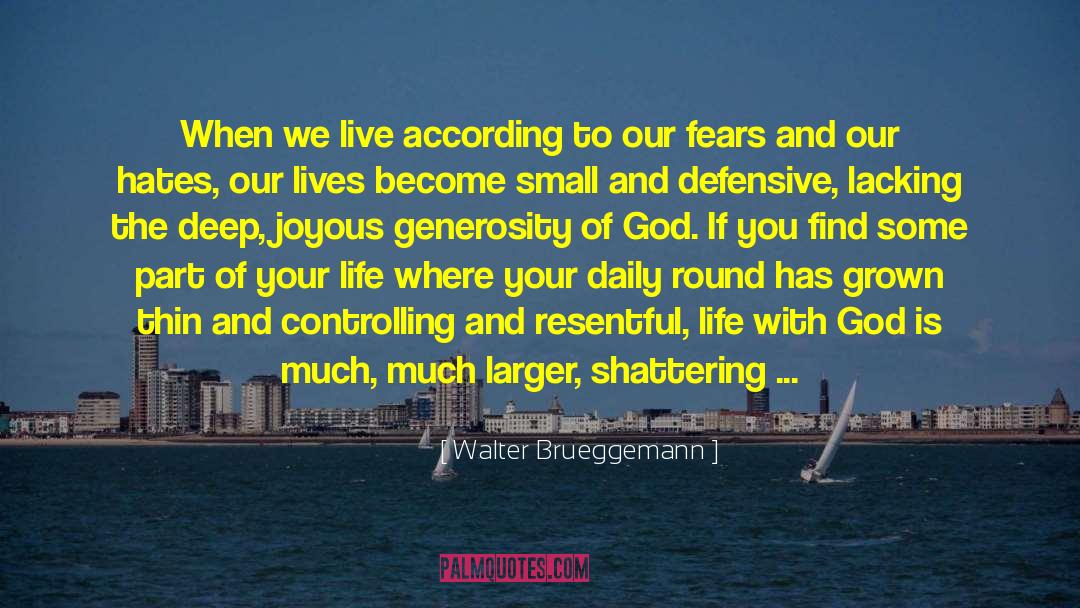
It is astonishing that critical scholarship has asked forever about the identification of these store-house cities, but without ever asking about the skewed exploitative social relationships between owner and laborers that the project exhibits. The store-house cities are an ancient parallel to the great banks and insurance houses where surplus wealth is kept among us. That surplus wealth, produced by the cheap labor of peasants, must now be protected from the peasants by law and by military force.
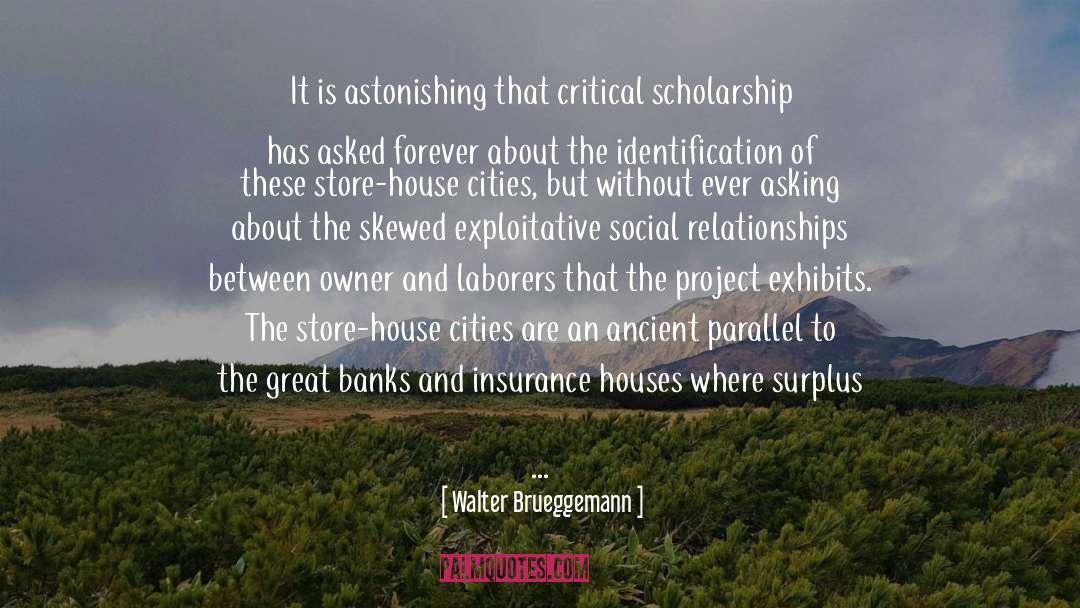
Hope, on one hand, is an absurdity too embarrassing to speak about, for it flies in the face of all those claims we have been told are facts. Hope is the refusal to accept the reading of reality which is the majority opinion; and one does that only at great political and existential risk. On the other hand, hope is subversive, for it limits the grandiose pretension of the present, daring to announce that the present to which we have all made commitments is now called into question.
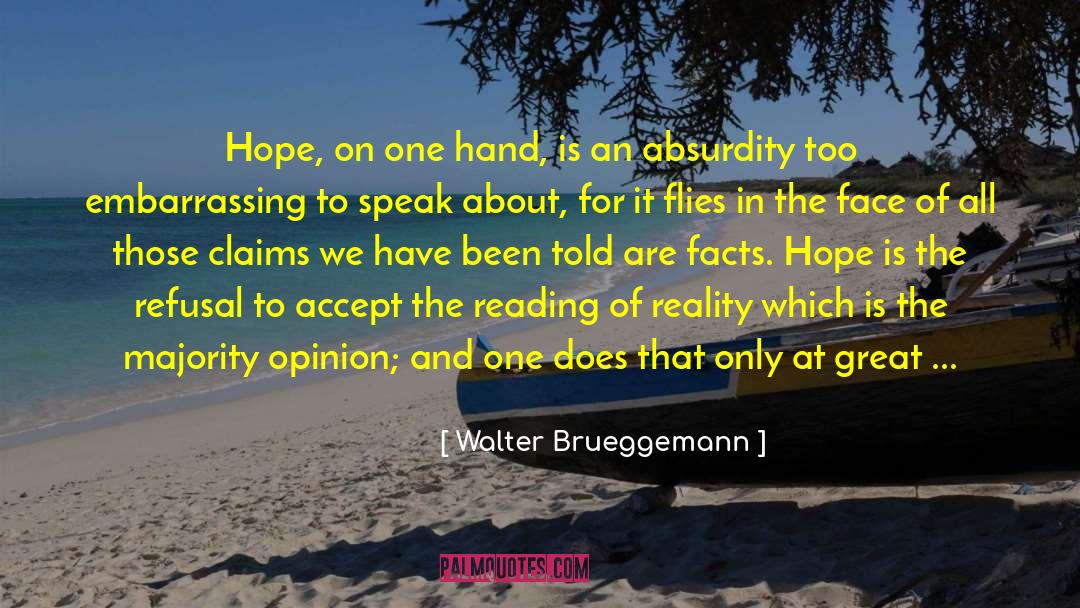
The gospel is fiction when judged by the empire, but the empire is fiction when judged by the gospel.
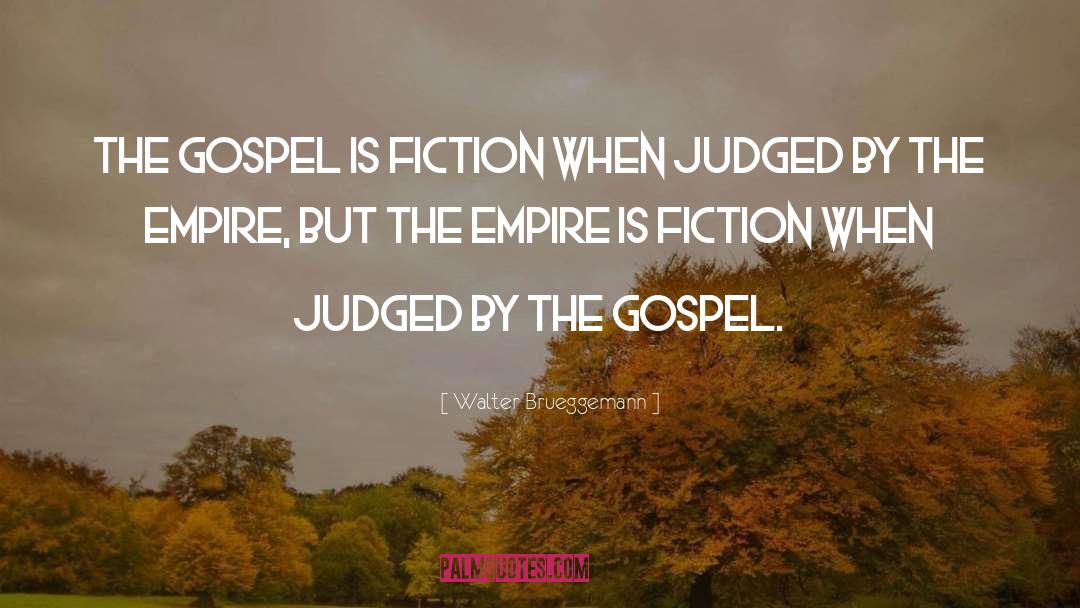
Our consumer culture is organized against history. There is a depreciation of memory and a ridicule of hope, which means everything must be held in the now, either an urgent now or an eternal now.
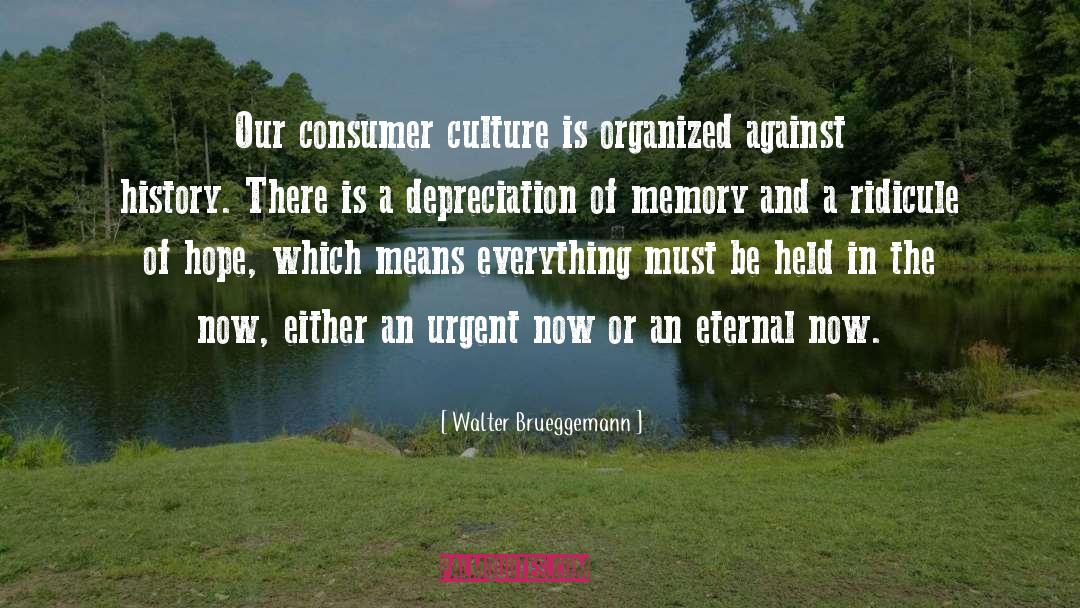
It is there within and among us, for we are ordained of God to be people of hope. It is there by virtue of our being in the image of the promissory God. It is sealed there in the sacrament of baptism. It is dramatized in the Eucharist - "until he come." It is the structure of every creed that ends by trusting in God's promises. Hope is the decision to which God invites Israel, a decision against despair, against permanent consignment to chaos (Isa 45:18), oppression, barrenness, and exile.
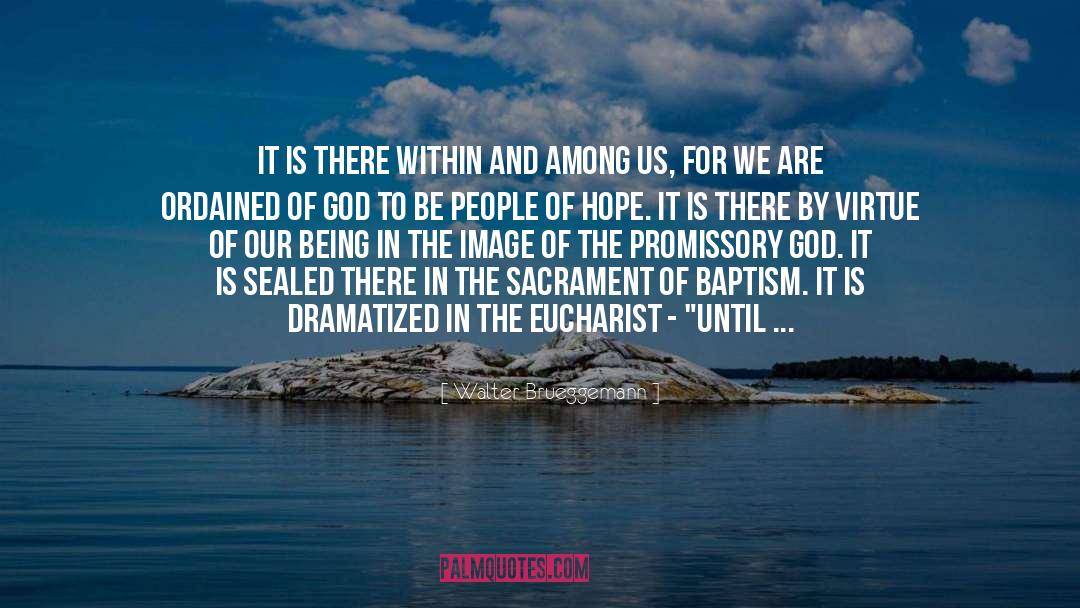
The Eucharist has been preempted and redefined in dualistic thinking that leaves the status quo of the world untouched, so congregations can take the meal without raising questions of violence; the outcome is a "colonized imagination" that is drained of dangerous hope.
